Legal Services
ESG, Sanctions Keeping Budapest Law Firms Busy
Following a long-standing tradition, we asked a number of leading law firms to give us their take on the legal market in Hungary, addressing the critical themes affecting their work and their clients. 9

U.K. has Left the EU, but English Law Still has a Significant Role
Anikó Kircsi, partner and head of corporate/M&A at CMS Budapest, and Eszter Török, senior counsel, discuss how large local businesses still come across English legal issues pursuing investments in the CEE region. 15
Keep Agile, Focused and
Sustainable
SOCIALITE
Budapest Space Aims to be Art and Business Hub
Supported by the newly merged Hungarian MBH Bank and its Foundation for Arts, Hungarian Art & Business (HAB), which opens on June 8, aims to promote the contemporary art scene in this country. 28
MNB Finally Announces Muchawaited Move
The National Bank of Hungary started to reduce the one-day deposit tender interest rate at its latest rate-setters’ meeting. The base rate, however, will remain at its current 13% level for a more extended period. 3
Andreas Szakácsi, of Claas Hungária, was one of three shortlisted nominees for the 2023 Expat CEO of the Year award. He discusses that honor, the gala event, and company plans for this year. 6

Economic Climate Restrains CEE Investment Activity
Q1 2023 saw CEE investment volumes decline by around 57% year-on-year. That is still marginally better than European results, where the decrease was 62%. Given current conditions, market activity for the remainder of the year could reach EUR 5.6 billion. 7
NEWS
HUNGARY’S PRACTICAL BUSINESS BI-WEEKLY SINCE 1992 | WWW.BUDAPESTBUSINESSJOURNAL.COM
SPECIAL REPORT INSIDE THIS ISSUE BUSINESS
BUSINESS HUF 2,100 | EUR 5 | USD 6 | GBP 4 VOL. 31. NUMBER 11 | JUNE 2 – JUNE 15, 2023
EDITOR-IN-CHIEF: Robin Marshall
EDITORIAL CONTRIBUTORS: Balázs Barabás, Zsófia Czifra, Kester Eddy, Bence Gaál, Gergely Herpai, David Holzer, Gary J. Morrell, Nicholas Pongratz.
LISTS: BBJ Research (research@bbj.hu)

NEWS AND PRESS RELEASES: Should be submitted in English to news@bbj.hu
LAYOUT: Zsolt Pataki

PUBLISHER: Business Publishing Services Kft.


CEO: Tamás Botka
ADVERTISING: AMS Services Kft.
CEO: Balázs Román
SALES: sales@bbj.hu
CIRCULATION AND SUBSCRIPTIONS: circulation@bbj.hu
Address: Madách Trade Center
1075 Budapest, Madách Imre út 13-14, Building B, 7th floor. Telephone +36 (1) 398-0344, Fax +36 (1) 398-0345, www.bbj.hu

What
The Budapest Business Journal, HU ISSN 1216-7304, is published bi-weekly on Friday, registration No. 0109069462. It is distributed by HungaroPress. Reproduction or use without permission of editorial or graphic content in any manner is prohibited. ©2017
BUSINESS MEDIA SERVICES LLC with
PICKING OUR WAY THRU A SEA OF RED AND WHITE
Summer deadlines always have a tendency to be distracting for those of us working away on the pages of this newspaper at BBJ Towers. Strains of jazz, the chinking of glasses, and the odd burst of raucous laughter often drift up from the eateries and bars of Gozsdu udvar. This collection of seven buildings and their courtyards in Pest’s District VII can be approached from Király, Dob, or Holló utca. According to the official website, it is the place “Where happy people meet.” By and large, it certainly sounds like it.
Tonight’s deadline, however, has seen things taken to a new level. It seems to have become a temporary home for at least some of the many Sevilla soccer fans in town for the 2023 UEFA Europa League final, due to kick off at the Puskás Aréna, the national stadium, at 9 p.m. As I may have mentioned, I am on a deadline, so I haven’t had time to go down and do a thorough investigation, but all I can see from the balcony is a sea of white shirts with red trim. The Roma fans, who sport a deeper red jersey with a natty yellow trim, must be somewhere else.
The chinking of glasses has gone, with plastic beakers very much the order of the day. Rousing soccer chants have supplanted loud laughter. I have heard it often enough to recognize “Campione, campione, olé, olé, olé,” but I am neither fluent in Spanish nor a particular football fan, so I can’t say precisely what the other songs are about.
fully booked. But I wonder how happy the ordinary residents of District VII will be. The area will quieten down as we get nearer to kick-off, but you know those fans will be back soon enough.
There is always a trade-off to be made for great sporting occasions. The hospitality sector, in particular, will be happy to make hay, but anyone trying to get across town from this afternoon on would have seen the traffic delays at first hand. I am reminded of the comments of a real estate consultant back when Hungary was bidding to host the 2024 Olympic Games before it eventually withdrew from the race in 2017. He admitted to having divided feelings. “Of course, as a proud Hungarian, I would love to see us win [the bidding contest], but if we do, all that will be built for years is the infrastructure for the games. Everything else will be put on hold; there won’t be money or resources or workers for anything for years. And can you imagine trying to get around Budapest?”
VISIT US ONLINE: WWW.BBJ.HU

Why Support the BBJ?
• Independence. The BBJ’s journalism is dedicated to reporting fact, not politics, and isn’t reliant on advertising from the government of the day, whoever that might be.
• Community Building. Whether it is the Budapest Business Journal itself, the Expat CEO award, the Expat CEO gala, the Top Expat CEOs in Hungary publication, or the new Expat CEO Boardroom meeting, we are serious about doing our part to bind this community together.
• Value Creation. We have a nearly 30-year history of supporting the development of diversity and sustainability in Hungary’s economy. The fact that we have been a trusted business voice for so long, indeed we were the first English-language publication when we launched back on November 9, 1992, itself has value.
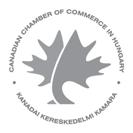

• Crisis Management. We have all lived through a once-in-a-century pandemic. But we also face an existential threat through climate change and operate in a period where disruptive technologies offer threats and opportunities. Now, more than ever, factual business reporting is vital to good decision-making.
For more information visit budapestbusinessjournal.com
I am sure the businesses around Gozsdu udvar are delighted with the boost to trade. A lot of the apartments around here seem to be short-rental properties. I guess many have been taken by the fans, who have been roaming the streets in increasing numbers since the start of the long weekend. Even five-star hotels have been
The capital gets a proud moment in the sun (better yet, under the Puskás Aréna floodlights) tonight. I wish those businesses that can benefit great success. Perhaps we will get a new generation of Spanish and Italian tourists longing to return over the next few years, looking to explore one of the great cities more peacefully and at a more leisurely pace. If you are trying to commute anywhere, good luck. And, above all, let us hope the evening passes with all the sporting drama you could wish for and none of the violence that can sometimes mar such events.
Robin Marshall Editor-in-chief
THEN & NOW
The color photo from the state news agency MTI shows Barnabás Tóth and Márk Asztalos on the third speed stage of the Salgó Rally near Salgótarján (110 km northeast of Budapest by road, relatively close to the border with Slovakia) on May 26. The black and white image from the Fortepan public archive shows the speed stage of the MunichVienna-Budapest Rallye on Hármashatárhegyi út, Budapest, on May 2, 1964.


2 | 1 News www.bbj.hu Budapest Business Journal | June 2 – June 15, 2023
all rights reserved.
We Stand For: The Budapest Business Journal aspires to be the most trusted newspaper in Hungary. We believe that managers should work on behalf of their shareholders. We believe that among the most important contributions a government can make to society is improving the business and investment climate so that its citizens may realize their full potential.
IMPRESSUM BBJ-PARTNERS THE EDITOR SAYS
Photo by MTI / Péter Komka
Photo by Fortepan / Közösségi Szociális Szövetkezet
Central Bank Finally Announces Much-awaited Move
The National Bank of Hungary (MNB) started to reduce the one-day deposit tender interest rate at its latest rate-setters’ meeting. The move came as no surprise; the base rate, however, will remain at its current 13% level for a more extended period, according to central bank governor György Matolcsy.
The MNB announced after its latest ratesetting meeting on May 23 that it would reduce the one-day deposit tender interest rate (which is basically the effective interest rate) and the one-day secured loan interest rate by 100 basis points. The decision met preliminary expectations.
In the accompanying statement, the central bank continues to emphasize the importance of a cautious approach.
The MNB “continuously evaluates” the incoming data and the evolution of inflation prospects and follows the effects of international financial market processes on the domestic risk environment with special attention, the bank wrote in a statement released after the decision.
If the improved risk assessment remains long-term, the MNB will continue to gradually lower the interest terms of the one-day tender to the base rate.
The stability of the domestic financial markets had improved “permanently” and “significantly” in the past period due to external and internal factors, the MNB highlighted in its announcement.
According to the central bank, recent banking system problems in developed countries have had no global spillover effects. Investors’ perceptions of emerging markets had generally strengthened. The risk of a European energy crisis has decreased, while the balance of Hungary’s current account shows a significant and “trend-like” improvement.
Inflation Still the Enemy
The capital and liquidity situation of the domestic banking system is stable. At the press conference following the interest rate decision, MNB governor Matolcsy
Value of Foreign Trade in Services in Hungary (Q1 2022-Q1 2023 at current prices, EUR million)

underlined that inflation is still a “close enemy” and that the central bank will do everything possible against it.
It continues to pursue a strict and consistent monetary policy; there is no talk yet – and nor will there be for a long time – of lowering the base rate. The central bank governor thinks that fiscal policy is consolidating so that it can be aligned with monetary policy.
Matolcsy also mentioned why he believes inflation is still higher in Hungary than in other countries in the region. He pointed to several reasons specific to Hungary, including the high deficit of the 2021 budget and the food price caps; the latter had helped in the fight against inflation in the short term but increased it in the long run.
Therefore, he again asked the government to drop price regulation as soon as possible. At the end of his speech, he stated that neither 24%, 14%, nor high single-digit inflation is acceptable in the long term (the central bank’s official inflation target is 3%, with a tolerance band of 1% on either side).
Although inflation reached its high water mark in January, the rate is still skyrocketing. In April, inflation calculated on an annual basis was 24%, food prices rose by 37.9%, household
energy by 41.8%, consumer durables by 9.3%, and services by 14.1 %. Core inflation is still extremely high, at 24.8%, only 0.9% down from the peak, while the fall in headline inflation was 1.7%.
In any case, the signs we have crested the peak are already visible, which is undoubtedly good news. Still, it is expected that achieving the goal set by the government (that inflation should be in single digits by the end of the year) will not be simple, Equilor analysts say.
Single-digit Interest Rate?
According to the assessment of experts at the banking news portal Bank360. hu, the interest rate reduction that has now started as expected could lead to the benchmark interest rate reaching the base rate of 13% by the beginning of the fall. If this happens, the base interest rate may drop below 10% by the end of this year or the beginning of 2024.
The gradual reductions of the key interest rate and then the base interest rate, expected to be 1% per month, will also impact interbank interest rates, thus allowing banks to start reducing interest rates on household and corporate loans. This process can be implemented gradually, in parallel with the central bank’s steps, analysts say.
“Despite the expected continuation of the reduction of the benchmark interest rate, we do not expect a significant
weakening of the forint exchange rate,” Gergely Suppan, head economist at MBH Bank, commented on the decision.
As a result of the double effects, the exchange rate of the forint may stabilize slightly below the level of 380
by the end of the year, Suppan thinks. He adds that swings cannot be ruled out in either direction, but they may be much smaller compared to last year’s turbulence. Unexpected international market turbulence may lead the forint exchange rate in a weaker direction, while access to EU funds could see it strengthen, he noted.
In the meantime, surprising investment data has been published by the Central Statistical Office (KSH). The volume of investments increased by 1% in the first quarter of this year from the previous quarter, while, based on year-on-year data, investment volume shrank by 2.8%.
Investments were able to rise again after two quarters of decline, and the turnaround is somewhat unexpected, especially in light of how poorly last year’s fourth quarter turned out. Based on the budget adjustment, the lack of EU funds, and the high interest rates, it had been deemed more likely that the decline would continue ahead of the news from the KSH.
www.bbj.hu Budapest Business Journal | June 2 – June 15, 2023 1
•
News
macroscope
ZSÓFIA CZIFRA
Exports Balance
Imports
Source:
Orbán Doubts Ukraine Victory, Szijjártó Digs in Over OTP Roundup Crisis Ukraine
Prime Minister Viktor Orbán said he does not believe that Ukraine can achieve a battlefield victory in its ongoing struggle with Russia in a conversation with Bloomberg editorin-chief John Micklethwait at the Qatar Economic Forum on May 23.

Micklethwait had initially asked how Hungary could block another package of aid that the European Union is seeking to give Ukraine, given that it had also once been invaded by Russia.
“Emotionally, it’s tragic; all of our hearts are with the Ukrainians. We understand how much they suffer,” Orbán said. “But I’m speaking here as a politician who should save lives. The most important thing for the international political community is to save lives. Especially when you are convinced as I [am], that there is no chance to win this war,” he explained. While admitting that Ukraine stood little chance without Western support, Micklethwait then asked the Prime Minister to clarify whether he thought that Ukraine could not win against Russia.
“My position is that looking at the reality, looking at the figures, looking at the surroundings, looking at the fact that NATO is not ready to send troops, it’s obvious that there is no victory for poor Ukrainians on the battlefield,” Orbán said. “That’s my position.”
Orbán’s response served as a partial justification for Hungary blocking a new tranche of the European Peace Facility, which would provide an additional EUR 500 million of financial aid to Ukraine’s war effort.
Listing Uproar
During a meeting of EU foreign ministers in Brussels on May 22, Hungarian Minister of Foreign
Affairs and Trade Péter Szijjártó reiterated that Hungary would continue to block the EPF until Ukraine removed OTP Bank from a list of “international sponsors of war.”
Ukraine’s National Agency on Corruption Prevention (NACP) had earlier included Hungary’s largest lender due to the bank management’s decision to continue its operations in Russia and what it said was OTP’s recognition of the “so-called Donetsk and Luhansk ‘people’s republics.’”
Calling the inclusion on the list “unacceptable,” Szijjártó said Hungary could not agree to any decision requiring further economic or financial sacrifice until the Hungarian lender is removed from the list.
Several of Szijjártó’s colleagues at the meeting disagreed with Hungary’s decision, for varying reasons, according to a report from Politico. German Foreign Minister Annalena Baerbock seemed to agree with the bank’s placement on the list,
citing unspecified reports that OTP recognized the Russian-occupied territories of Luhansk and Donetsk, flouting international law, and had extended credit lines to Russian soldiers, a claim which Hungary and its largest lender had expressly denied. Others urged Hungary to decouple its friction with Kyiv over the “war
sponsors” list from the EU’s attempt to approve more military aid and sanctions. One diplomat even expressed confusion over why Hungary has become so preoccupied with the Ukrainian list, given that it has no legal bearing.
Meanwhile, the Council of the EU, the grouping of EU governments, said that EU ministers responsible for trade had agreed to suspend restrictions on imports from Ukraine for a further year on May 25 after agreeing to a temporary ban on the import of specific agricultural products from Ukraine in late April.
While the EU had lifted tariffs and other restrictions on imports for an initial 12 months in June 2022, certain EU member states, such as Hungary and Poland, had imposed a ban on agricultural imports from Ukraine in April, after the countries’ markets had been flooded with cheap grain from their eastern neighbor, to which the EU had temporarily acceded.
4 | 1 News www.bbj.hu Budapest Business Journal | June 2 – June 15, 2023
NICHOLAS PONGRATZ
In this picture released by the Prime Minister’s Press Office, Prime Minister Viktor Orbán (right) is interviewed at the Qatar Economic Forum in Doha on May 23, 2023, by John Micklethwait, editor-in-chief of Bloomberg.
Photo by Benko Vivien Cher / MTI / Prime Minister’s Press Office.
“My position is that looking at the reality, looking at the figures, looking at the surroundings, looking at the fact that NATO is not ready to send troops, it’s obvious that there is no victory for poor Ukrainians on the battlefield.”
More Developers Delivering Well-accredited Office Buildings Green Matters
A monthly look at environmental issues in Hungary and the region
IBM has established its headquarters in the first 16,000 sqm phase of the Corvin Innovation Campus. The complex, in the immediate vicinity of the Corvin Promenade, was developed according to Well “Platinum” and Breeam “Excellent” certifications to ensure it positively impacts the wellbeing and health of the people that work there, according to the developer Futureal.

GARY J. MORRELL
The complex has also been designed to meet the needs of energy-sensitive users as the campus is one of only two office buildings in Hungary to have thus far obtained the highest “AA+” energy certification, Futureal adds.
“In recent times, soaring energy prices have become a crucial factor for the operation of companies, and our newly completed development addresses this challenge as well,” says László Balassa, project director of the Corvin Innovation Campus.
“Every aspect of the office building has been designed to provide an inspiring and healthy working environment for employees while offering tenants a predictable, sustainable, and unique service through energy-efficient and forward-thinking solutions. Our decision is confirmed by the market, as we continue to see strong tenant interest,” he adds.
Hungary currently has five Wellcertified office buildings, compared to four in the Czech Republic and another four in Romania. This latter country has doubled its Well-accredited office stock in the first quarter of the year.
The number of Well buildings in Europe has increased to 234, representing a 10%
rise
in three months, according to Regina Kurucz, a Well assessor and head of the Well working group at the Hungarian Green Building Council (HuGBC).
A notable new CEE Well-accredited office development is the 31,000 sqm U-Center, located in a prime site between two parks in Bucharest.
The five Well buildings in Hungary put the country in ninth place in the Europe Top 10, followed by the Czech Republic, Romania, and Ireland in joint 10th, adds Kurucz. She adds that the MSD headquarters at Millennium Gardens is one of just two pre-certified office interiors in Hungary. Another seven Well pre-certified projects in Hungary are so-called Well core office buildings larger than 9,000 sqm.
The Well Health and Safety rating system is becoming increasingly popular in Europe: in Poland alone, 109 locations are certified. This includes offices in the capital Warsaw and Krakow, and railway stations, hotels and conference centers in Gdansk, Lodz and Poznan.
Carbon Assessments Required
A whole life carbon-emission assessment is needed in targeting zero carbon emissions in the built environment in relation to embedded carbon emissions, said Simon Sturgis, architect and founder of Targeting Zero, the Carbon Consultancy, at the recent HuGBC Green Brunch.
Participants such as architects, developers, energy and sustainability
consultants, and facility and property management staff discussed the practicalities of reducing carbon emissions.
For new buildings, the majority of lifetime carbon emissions will be directly attributable to materials, construction, and maintenance, according to Sturgis.
“Tackling climate change is the biggest environmental challenge that we face today. The built environment is a major contributor through the carbon emissions from both construction and use,” he said at the brunch.
“Reducing carbon emissions through better building design, low carbon material choices, resource efficiency, and circular economic strategies is, therefore, no longer optional but, with the right advice, economically achievable,” he added.
There are two types of carbons, explained Zsombor Barta, ambassador to the HuGBC and founding partner of Greenbors Consulting.
“The first one and easier to understand is operational carbon and operations emissions; if you are heating or air conditioning a building, then you are using fossil fuels, then there are direct emissions,” he said.
“However, the more complex element is imbedded carbon, which means that, even if you have a green building, you already have a negative package of carbon emissions because the materials that you used to construct the building needed to be produced or manufactured, excavated and transported and built-in,” Barta argued.
“All of these activities also have direct emissions. This means that all buildings have a big package of embedded carbon in addition to a package, which is usually a smaller one, of ongoing operational carbons,” he noted.
Barta accepted that the concept of embedded carbon “is tricky and complicated to calculate” and said that is why Sturgis is part of a Royal Institution of Chartered Surveyors working group that, along with the EU, is working on an international standard to harmonize the calculation of the embedded carbon.
“As you can imagine, a building is made of many different materials, and so where do you draw the lines of calculating embedded carbon? The RICS and the World Building Council are, therefore, involved in framing the methodology, what needs to be included, and what is the methodology to calculate embedded carbon,” Barta added.
The initiative comes from the European Union’s New Green Deal and the EU climate target to become a net-zero economy by
2050;
this is seen as pointing the entire building sector in this direction, but the question remains how to measure and account for what is net-zero.
“This is easier with regard to operation as this covers, for example, consumption with renewable on-site or off-site. Then, if you have no more direct emissions, it is already net zero. But if you dig a little deeper and take into account the materials the built environment is made of, then you need also to cover the embedded carbon element. This needs to include stakeholders who are responsible for the building sector, such as manufacturing and production companies; their activities and products need to become net-zero as well. There is a whole chain of stakeholders within the built environment sector,” Barta concluded.
1 News | 5 www.bbj.hu Budapest Business Journal | June 2 – June 15, 2023
The MSD office at Millenium Gardens is one of just two Well pre-certified office interiors in Hungary.
2 Business
Keeping Agile, Targeting Sustainability, Focusing on Personal Relations and, Naturally, the Customer
Andreas Szakácsi, managing director of Claas Hungária, was one of three shortlisted nominees for the 2023 Expat CEO of the Year award. The Budapest Business Journal asked him about that honor, the gala event, and the plans for the company this year.
BBJ: Congratulations on being shortlisted for the Expat CEO of the Year award. What are your recollections from the night of the gala?
Andreas Szakácsi: The whole evening was something special to me. It started with entering the venerable Corinthia Hotel Budapest, full of anticipation and excitement. From the beginning, there was this very special festive atmosphere that continued into the ballroom. It was great to get to know new people and meet old friends again. I definitely received a lot of new impulses and ideas that also created new perspectives for myself, and I once more realized the massive diversity in our expat community. And yes, simply to be in the center of attention with Veronika [Spanarova of Citi, the eventual] and Matt [Zeller of Novartis, the other runner-up] was very special.
BBJ: What do you think the fact that you were shortlisted means to your team?
ASz: It creates a huge motivation and pride, as the development and results of the company during the years are created by the team, of which the CEO is only a part. The CEO sets the targets, direction and guardrails to achieve the company goals. On the other hand, the CEO has to provide and organize resources to give the team the best base and the tools to run the operational
business, execute projects and achieve the goals. And resources do not mean only the money; it also means having enough (and the right!) people on board and getting the best support from the headquarters and externals. The shortlisting reflects that our work is noticed and appreciated outside as well and that the CEO, as the team leader, did his job well. This creates excellent motivation and loyalty.
BBJ: You are German but have a family connection to Hungary, as indicated by your surname. How often did you visit the country growing up, and what were your impressions when you first moved here to work?
ASz: My first visit to Hungary was more than 50 years ago, followed by regular visits during my teenage years and as a student. Of course, my picture of Hungary was dominated by relatives and friends, by holidays and sightseeing around the country, and do not forget it was still the old political system.
When I moved to Hungary for my expat job roughly 40 years after my first visit, I saw a country with a lot of development in Budapest and the big cities. Infrastructure, shops, and language skills had really improved. Compared to my experience, people were much more open. Professionally it was similar; new, modern companies had been established in Hungary, and Hungarian employees were eager to learn and develop. A take-off mood
could be felt. On the other hand, the countryside had hardly changed. Visiting my father’s village in BorsodAbaúj-Zemplén County and many other rural places, I could scarcely notice any change, and this is still the case today.
BBJ: The parent company began 110 years ago as a family company, grew into what the Germans would consider a mittelstand, the nearest translation to which in English would be a mediumsized business, in the 1990s, and today is a global player with 12,000 employees. You have worked for Claas, in Germany and Hungary, for almost 22 years, and before that, for ThyssenKrupp, a public multinational. How do they differ?
ASz: A family business is much more permeable through the hierarchies. The hierarchy is usually flatter, and new ideas and concepts can be communicated quickly to the decision-makers. Today, you would say it is more agile. On the other hand, decision-making is more long-term oriented and thus less hectic, sometimes even slower. Strategy and roadmaps have a relatively longterm perspective, strongly targeting sustainable results and safeguarding financial independence with a strong and loyal workforce. Acting very professionally, a family company has a stronger focus on personal relations and is, therefore, more tolerant towards deviations. Last but not least, the customer focus is stronger and can be felt every minute in all areas.
BBJ: What are Claas Hungária’s plans for the remainder of 2023 and the medium term?
ASz: As we are in a phase of robust market demand for agricultural machines and technologies, our 2023 plans concentrate on serving our customers punctually for their harvest with our high-quality products. Supporting our suppliers and investing in new equipment was, therefore, the focus. Further steps are targeting further automation and digitalization of our operational processes, and to grow our educational base further in vocational areas, as well as with the universities, to safeguard expected growth in engineering activities and adapt to a growing product portfolio. Our role as a global hub for Claas components and product delivery will increase; within the engineering network, we are considering greater use of Hungary for product validation.
BBJ: The Expat CEO of the Year title wasn’t the only prize awarded at the gala on March 24. How important is the work of Andrea Solti Istenes (president of HBLF and country chair of Shell Hungary), who was presented with the inaugural Community Award?

ASz: In our business life, the focus is mostly on operational and financial results. That makes it all the more important to give explicit platforms and space to emphasize the importance of the human side: for the business, in the business, and for society as well. She touches and promotes all the essential topics for wellbeing and healthfulness in our social and professional lives and includes aspects that perhaps are not self-evident. Her work is a crucial base for developing a sustainable and diversified world.
BBJ: Finally, do you have a word for our 2023 Expat CEO winner, Veronika Spanarova, and the other runner-up, Matt Zeller?
ASz: Once again, congratulations to Veronika and Matt. It was impressive to see their personal and company contribution and activities in and for Hungary. Please, continue with the same energy, enthusiasm, and commitment in the future, and hopefully, our paths will cross again at one or another event, competition or project.
www.bbj.hu Budapest Business Journal | June 2 – June 15, 2023
ROBIN MARSHALL
Andreas Szakácsi (left) and Robin Marshall.
Economic Climate Restrains CEE Investment Activity
The first quarter of 2023 saw CEE investment volumes decline by around 57% year-on-year. That is still marginally better than European results, where the decrease was 62%. Given current conditions, predicting market activity for the remainder of the year is challenging but could reach EUR 5.6 billion, according to Colliers in its Q1 2023 Investment Scene report.
“Volumes across CEE were some of the lowest levels recorded since the GFC [Global Financial Crisis of 2007-2008]. Poland still secured a 50% share of first quarter 2023 volumes, followed by the Czech Republic with 31%,” comments Kevin Turpin, director of capital markets for CEE at Colliers.
“Interestingly, Romania and Bulgaria both had a better start to the year than in
2021
and 2022. A meaningful recovery still rides greatly on an improved inflationary and interest rate environment to close the pricing mismatch,” he adds. Hungary
traditionally stands third in CEE investment volumes after Poland and the Czech Republic.
“With a lack of evidence in the market, it remains a challenge for all market players to pinpoint where yields currently are. This then leads us to provide a more sentiment-based, in-house view, taking current market conditions into account,” adds Turpin.
“Amongst other things, these need to address the various elephants in the room, such as interest rates, ESG compliance, and structural changes to occupier markets for some sectors,” he concludes.
Colliers estimate yields for Hungary stand at 6% for office, the same for industrial, and 6.75% for shopping centers. This compares to the lowest CEE yields in Prague at 5.25% for office, 4.75% for industrial, and 5.75% for shopping centers.
Real Estate Matters
A biweekly look at real estate issues in Hungary and the region
CEE Office Yields
Despite the reduced levels of activity, the dominance of domestic capital prevails, with CEE capital being responsible for
53%
of investment volumes, most notably Czech at 41% and Hungarian at 5%.
Higher Financing Costs
Financing costs are currently seen as between 5% and 6%, driven by significantly higher interest rates than 12 months ago, as well as the costs of financial tools such as interest rate swaps. In addition, the previously generous spread between other investment strategies, such as bonds, has diminished and also caused investors to pause and reassess their portfolios and strategies.
With regard to sectors, industrial and logistics has reclaimed its leading position over offices and retail in the region. Significant transactions included Panattoni disposing of more than EUR 300 million in assets in Poland. In the retail sector, Trei divested its supermarket portfolio across the Czech Republic and Poland for more than EUR 200 mln.
Coca-Cola HBC Hungary Makes Biggest Investment in 16 Years in Dunaharaszti
Coca-Cola HBC Hungary, which claims to be the largest beverage company in the country, says it is investing around EUR 23 million (about HUF 8.7 billion) to upgrade its production and logistics capacities. The firm is expanding its headquarters at Dunaharaszti (just 21 km south of central Budapest by road) with a new production hall that will house a highperformance production line by the end of the year.
The company, part of the Coca-Cola HBC Group, says it is also improving loading and warehousing efficiency. The investments demonstrate the Hungarian subsidiary’s commitment to the local market and mark another significant step towards building the largest Central European production hub “of the Coca-Cola System” in Dunaharaszti, the business says.
“We are proud to contribute to the growth of the Hungarian economy with a major new investment. We are committed to the domestic market and supporting our business operations in all areas of the value chain through continuous improvements. We have made several investments in recent years that bring us closer to building a modern production hub in Dunaharaszti that meets the requirements of the 21st century,” says László Békefi, general manager of Coca-Cola HBC Hungary.
“To support this goal, we invested more than HUF 1.5 billion in our supply chain last year: we were the first in the CocaCola HBC Group to introduce artificial intelligence-driven robot technology into our warehousing processes, our colleagues use smart glasses during the picking process to work more efficiently and accurately, and thanks to a sustainable packaging technology innovation, we have replaced the secondary packaging of our aluminum multipacks with 100% recyclable cardboard packaging, reducing our plastic consumption by 230 tons per year,” he notes.
The firm has been developing its production operations in Hungary since 1996. The company has thus far invested HUF 125 bln in the country over the past 27 years, and today has two production plants and eight logistics distribution centers (including what it says is Hungary’s largest food industry warehouse) that employ 1,000 people. Nearly two-thirds of the materials used in production come from domestic
“International capital is still seeking opportunities in the region; however, the combination of fewer opportunities being openly marketed, and the widely discussed macro and financing challenges, are currently causing many to put decision-making on hold. As a result, we can expect to see a similar trend for the remainder of the year,” says Colliers.
“The global outlook remains quite mixed: while we are starting to have more clarity on inflation, this does not necessarily mean more clarity on interest rates or the threat of a banking crisis and a potential credit crunch in advanced economies,” Turpin points out.
“Other geopolitical and COVID-related crises remain in place, which explains why the global economic outlook, along with the CEE-6’s outlook worsened a bit compared to a few months ago. That said, as long as no external event is driving a material downward shift in economic activity in the Eurozone, we would expect the CEE to continue to outgrow their Western partners over the long term, thanks to EU funds and an attractive business backdrop,” he concludes.
suppliers. The entire Hungarian market and most products for 17 export countries are supplied from here.
Coca-Cola HBC Hungary says the capacity expansion investment is the second most significant development in Dunaharaszti following the installation of a second non-carbonated production line in 2007, worth EUR 27 mln (about HUF 10.2 bln) at the time.
Planning of the investment started in 2020, with the installation of the new production line and the construction of a new production hall, as well as the completion of logistics and other infrastructure improvements to support the increased volume, approved in 2022. The construction works started in February, with the handover is expected in November.

2 Business | 7 www.bbj.hu Budapest Business Journal | June 2 – June 15, 2023
GARY J. MORRELL
BBJ STAFF
Prague 5.25% Warsaw 5.25% Bratislava 5.85% Budapest 6% Bucharest 6.75% Source: Colliers
Small U.S. Banks and Commercial Real Estate: A Doom Loop?
Finance Matters
A biweekly look at financial issues in Hungary and the region
Achilles heel? All because the Fed acted irresponsibly in artificially depressing interest rates for years, then slammed on the brakes with the fastest rate hikes in U.S. history.
4. Tighter Loan Market
The prime rate (which banks charge to their most creditworthy customers) has shot up from just above 3% at the end of 2020 to just above 8% as of May 2023. Interest rates expense for loans about to renew or variable rate mortgages has almost tripled over three years. Many bankers also talk of tighter terms and conditions (coverage ratios, percentage of collateral, etc.)
Here’s a step-by-step breakdown of what the scenario looks like:
1. Small banks in the United States hold more than 70% of commercial real estate loans.
2. Prices on most types of commercial real estate in most localities are falling; in some major cities, it is estimated that 90% of properties are “underwater” (the debt on the properties exceeds the value of the property).
3. A flight of deposits from small to large banks and money market funds decreases the capital available for real estate loans.
4. A tighter loan market, including higher interest rates, is also making it more challenging to refinance real estate.
5. If current owners of commercial real estate cannot refinance, a wave of defaults may ensue, leading to further decreases in commercial real estate prices and bankruptcy of small banks, a negative spiral or doom loop.
Now that I have laid out the big picture let me provide more color and context on each of the above points.
1. Small Banks and Commercial Real Estate
Small and mid-sized banks (in other words, all except the top 25 banks) hold more than 67% of commercial real estate loans. Commercial real estate constitutes some 43% of small bank loans in the States.
2. Commercial Real Estate Prices are Falling
Commercial real estate prices have fallen about 5% since their peak in mid-2022 and are forecast to drop 15-20% further as the cycle plays out:

The chart is based on U.S. national averages. In cities hit by particularly high office vacancy rates (Los Angeles, for
example), the situation is much worse. According to real estate consultancy Colliers, L.A. office towers carry an average of more than USD 230 debt per square foot, while the market value is USD 154/sqft. Brookfield, the city’s biggest commercial landlord, defaulted on more than USD 1 billion in loans this year.
In the United States, it is estimated that approximately USD 1.5 trillion in commercial real estate loans are coming due by the end of 2025, with the potential of being underwater. This will create distress sales and further depress real estate prices.
3. Flight of Deposits From Small Banks
In the second half of March 2023 alone, some USD 230 bln in deposits were withdrawn from U.S. small banks. While the situation since has more or less stabilized, this withdrawal leaves a gaping hole in the ability of small banks to finance and refinance commercial real estate. Further flights of capital remain possible. Understandably, small banks have become much more cautious about commercial real estate lending.
While increasing interest rates have caused bond values to fall, under current regulations, banks do not need to write these down to market value if held to maturity. Hence, although healthy on paper, according to Professor Amit Seru of Stanford University, almost half of America’s 4,800 banks have, de facto, burned through their capital buffers.
Isn’t it ironic that U.S. Treasuries, meant to be the pillar of stability of the global financial system, are now its
A significant source of liquidity for mortgage markets, Commercial Mortgage-Backed Securities, where banks securitize and resell bundles of mortgages, have virtually seized up. As of March 2023, the volume of CMBS lending declined by 85%

compared to a year ago, further tightening the loan market.
5. Negative Spiral
The above amply demonstrates the potential for a doom loop; this risk further increases in the event of a recession. At the highest risk will be those properties with floating rate mortgages or mortgages expiring soon. There is also the potential for contagion. A foreseeable contagion would be towards municipal finance, as the amount of property tax paid by commercial real estate owners could drop dramatically.
According to Fed chair Jerome H. Powell: “We’re well-aware of the concentrations [.…] in commercial real estate [….] the banking system is strong, it is sound, it is resilient, it’s wellcapitalized.” Is he talking of the same banking system?
Professor Seru’s interpretation is, unfortunately, perhaps more credible: “A lot of the U.S. banking system is potentially insolvent.”
Les Nemethy is CEO of EuroPhoenix Financial Advisers Ltd. (www.europhoenix.com), a Central European corporate finance firm. He is a former World Banker, author of Business Exit Planning (www. businessexitplanningbook.com), and a previous president of the American Chamber of Commerce in Hungary.
8 | 2 Business www.bbj.hu Budapest Business Journal | June 2 – June 15, 2023
There is the possibility of a negative spiral developing between small U.S. banks and commercial real estate, Finance Matters columnist Les Nemethy warns.
Source: MSCI, Capital Economics
Photo by Andrii Spy_k / Shutterstock.com
U.S. Commercial Property Peak-to-Trough Capital Value Falls (%)
3 Special Report
Legal Services
ESG, Sanctions Keeping Budapest Law Firms Busy
BBJ: How would you describe the state of the legal market in Hungary today, and how has this»changed? Is the market stable now, or might we see either consolidation or new entrants?
Erika Papp: We have seen some new foreign investors enter the Hungarian market in the last year, and Asian investors are showing greater interest in the country. In addition, the energy market has soared while the number of restructurings fell short of expectations. Applied legal tech services are highly sought after by clients, and typically, law firms like CMS, with an extensive multinational network, have the apparatus that allows them to be a leader in the legal tech world.
Gábor Király: Anticipated economic turbulence is expected to drive consolidation within the legal market. In parallel with this, specific segments of legal practice, such as restructuring and dispute resolution, will gain momentum, offering new opportunities for market players.
Ákos Fehérváry: There were no significant changes in the last few years. The effects on the Hungarian market of the fresh A&O Shearman merger are yet to be seen, but I do not expect significant shifts in the market in the near future.
Kristóf Ferenczi: The Hungarian legal market is stable and predictable, while smaller boutique firms continue to emerge. In this highly competitive environment, we do not expect significant new entrants other than looking with interest at the contemplated
creation of A&O Shearman.
Katalin Szamosi: The economic crisis and the high inflation have a very adverse effect on companies’ financial situations. Therefore, the available funds for legal expenses are decreasing, and managers consider thoroughly if they want to engage lawyers. This means fewer mandates and reduced fees.
Law firms have to cut their spending because, besides the reduced income, the crisis affects them too.
András Szecskay: We see a growth opportunity in ESG work because the scope of the developing EU regulation framework now extends not only to financial institutions and listed companies but also to their suppliers. Therefore, we see a lot of potential enforcement against clearance/greenwashing/social washing claims. Also, we expect more work related to supply chain contracts.
Zoltán Faludi: The legal market concerning international players has
been very stable for the past few years, and I don’t anticipate any change in this respect. There have been, of course, a few boutique and local firms popping up or closing, but these have no significant effect on our clientele or workload.
BBJ: What percentage of your workload is taken up with ESG compliance, and how do you see this developing?
Csongor Tompa: ESG is very important for our law firm, especially regarding green financing, green bonds, etc. Generally, we see more ESG-related work, but the market is still forming.
EP: ESG compliance accounts for 10-15% of our aggregate compliance and regulatory-related workload. However, ESG will increasingly influence companies and decision-makers due to the recently adopted corporate sustainability reporting directive (CSRD) to be implemented into Hungarian law in 2024. Furthermore, as the corporate
sustainability due diligence directive (CSDD) moves towards official adoption, we expect increasing client requests to help with ESG compliance.

GK: Due to new EU-wide regulations, ESG compliance work is gaining significance in the legal market, especially in the real estate and financing sectors. The regulatory landscape surrounding ESG is evolving swiftly, with a steady stream of new mandates being introduced; therefore, ESG issues are now at the forefront of corporate thinking, presenting risks and opportunities.
ÁF: ESG is one of the current hot topics, which affects every industry and practically every field of the law. Some sectors and clients are more advanced in this process, while others are currently picking up, and we lawyers must help clients understand where, why, and how ESG may be relevant for them.
www.bbj.hu Budapest Business Journal | June 2 – June 15, 2023
ROBIN MARSHALL
Following a longstanding tradition, we asked a number of leading law firms to give us their take on the legal market in Hungary, addressing the critical themes affecting their work and their clients.
Continued on page 10 ›››
Photo by Mongta Studio / Shutterstock.com
Do Androids Dream of Biased Judges? Self-fulfilling Prophecies in AI Litigation Prediction
Dr. János Vajda Attorney at Law and cognitive psychologist, Partner
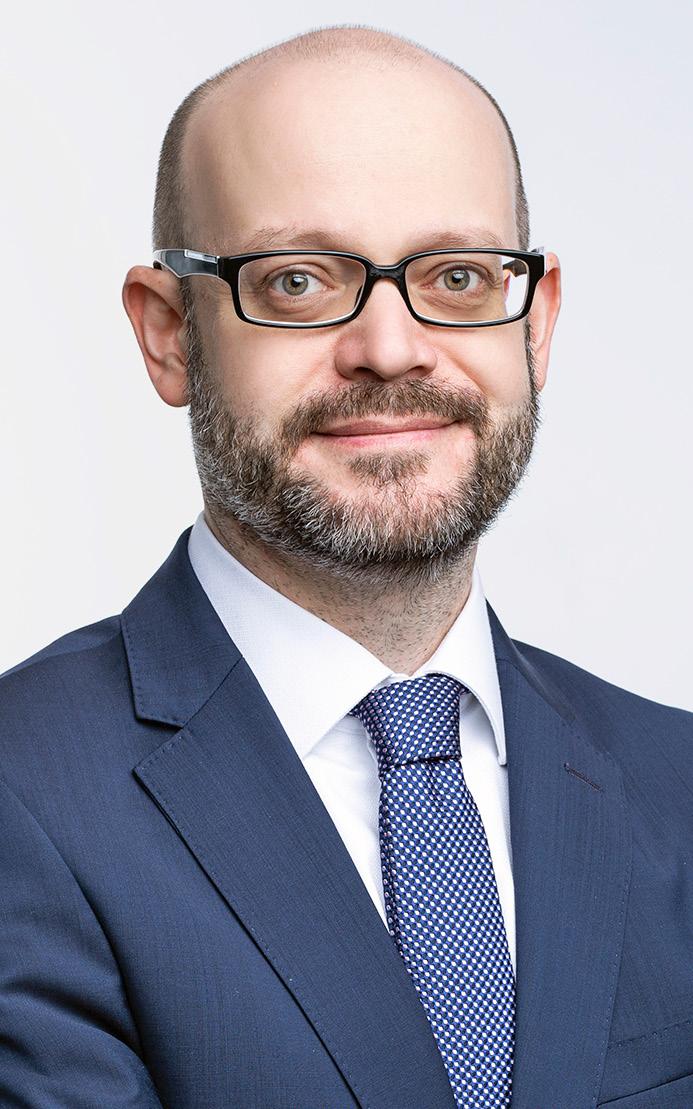
 Szecskay Attorneys at Law
Szecskay Attorneys at Law
It is not exactly breaking news for anyone that technology is rapidly changing the legal profession. Although, lately, it has been all about chatGPT and other generative AI tools, another exciting domain of artificial legal intelligence is quantitative legal prediction (QLP) which is also gaining increasing traction in the market.

QLP uses the dataset of previous litigation cases to learn the correlations between case features and target outcomes. The underlying variables are manifold: who the judge in the case is; the type of legal arguments used; which precedents are cited by a particular judge; the weight of evidence attributed to specific pieces of evidence by the judge, even whether the judge is prone to certain cognitive biases (such as the hindsight bias, the conjunction fallacy, the anchoring effect, framing bias, and confirmation bias). The legal counsel can then use the result of this calculation to make predictions concerning the case and make strategic decisions within the adjudication process.
As a result, QLP can identify the personal tendencies of particular judges that would otherwise be invisible to lawyers. Nevertheless, there is growing concern that AI systems learn and exaggerate human cognitive biases.
One way bias can creep into algorithms is when AI systems learn to make data-based decisions, including biased human choices. If the algorithm is based on biased human decisions, then inevitably, the AI will also reflect such biases, and most likely, it will even exaggerate these biases by holding them true for its future decisions and our outcome predictions.
Even though our decisions based on the AI’s conclusions seem reasonable, they might be profoundly flawed if we put them in a broader perspective. Assuming that our super recognizers’
conclusion is on point and has pinned a judge’s bias right, and we decide not to fight for our case and indirectly against this bias, we have just put one more brick into the wall of the justification mechanism. Worse yet, when we (or someone else) find ourselves in a similar decisive situation with the same judge, the biased pattern of the judge will be even more visible to our super-recognizers, and they will assign more significant weight to this variable when computing next time. Thus, ultimately, we will find ourselves in a never-ending cycle of our AI reinforcing the given bias of the judge.
When we buy into the idea that our case has already been decided by a biased judge, disregarding our legal arguments, we profoundly compromise our right to participate in the adjudication process. If we make decisions in this spirit, our super-recognizer’s predictions will become self-fulfilling prophecies. The AI’s expectation will lead to its confirmation.
We must also remind ourselves that even though the algorithms can outline significant patterns specific to judges, they don’t necessarily refer to existing biases. Based on the previous, one should not overestimate the reported results of the algorithms. Another concern is that applying QLP might undermine the fairness of the litigation process. This unfairness might stem from violating the principle of equality of arms. If predictive justice becomes increasingly influential, unequal access to these tools will enhance the advantage that the wealthier and more powerful litigation parties have over those who cannot access QLP tools.
It is noteworthy that, for the above reasons, the French legislature introduced a controversial rule in 2019 that bans the use of QLP for outlining a judge’s patterns and predicting case outcomes based on the prior behavior of the judge. Although the somewhat harsh legislation caused a severe backlash and was criticized by many scholars and free speech organizations, it can, in some ways, be considered an extension of the European concerns around the ethical use of AI. Hopefully, the soon-to-beadopted and much-awaited AI Act of the EU will clarify the European rule maker’s stance on this issue.


We see a rapid increase in client interest and expect a significant volume of related work in the coming years.
BBJ: 2022 was another record year for FDI inflows. How supportive is the Hungarian legal environment to foreigners for establishing and doing business here? Are there any bottlenecks you would like to see removed?
CsT: The FDI screening mechanism introduced in response to the COVID-19 pandemic makes transactions with foreign investors much slower. The rules are difficult to interpret, and minimal case law is available, so we must be cautious. Also, with the state of emergency powers of the Hungarian government, the overall legal framework is in constant change, which makes the climate more uncertain.
KF: Hungary has for long been proactively supporting foreign direct investments, including providing
financial support measures, as well as special regulatory regimes to ease licensing and permitting procedures’ burdens for projects of significance for the Hungarian economy. As a result, investments have been ramping up in, for example, the automotive, IT, and battery sectors. In our practice, we see a continued inflow of foreign investment from Southeast Asian countries, which we are responding to in part through our dedicated “Chinese desk.” FDI control has become an active service line, where we see that under the current local FDI regime, approval requirements may arise for certain transactions even if the ultimate ownership structure does not otherwise change (e.g., in the case of certain intra-group restructurings). In such cases, approval requirements may create an additional administrative burden and delay the efficient implementation of reorganizations.
KSz: We do not consider the years 2022 and 2023 suitable legal environment for foreign investments, except the ones classified as a priority investment by the government.
ASz: The legal environment is getting increasingly rigid in this regard, but this is not Hungary-specific. We see the same trend across Europe and overseas. In general, investors are welcome. But under the current political and economic framework, screening has become a necessity. The process could be improved with more transparency of the case handling, which would enable the parties to plan the transaction schedule better, and a pre-clearance or consultation options. Civil organizations and chambers of commerce are lobbying for greater transparency, but we must live with the fact that this is a screening process to protect national security. Therefore, the absence of complete legal certainty will always remain an issue.
10 | 3 Special Report www.bbj.hu Budapest Business Journal | June 2 – June 15, 2023
NOTE: ALL ARTICLES MARKED INSIDE VIEW ARE PAID PROMOTIONAL CONTENT FOR WHICH THE BUDAPEST BUSINESS JOURNAL DOES NOT TAKE RESPONSIBILITY
INSIDE VIEW
www. szecskay.com
András Szecskay
Kristóf Ferenczi
Katalin Szamosi
Continued from page 9 ›››
ZF: Hungary’s FDI screening control mechanism and the related regulatory framework have undoubtedly created an air of uncertainty, and it is still constantly evolving; this topic needs to be addressed during any transaction. The screening mechanism, while by no measure unprecedented, does appear to be somewhat overarching. For example, it treats intra-EU and extra-EU investments the same, which might be more stringent than its original purpose. Nevertheless, we see that the investors’ appetite is steady and robust. I believe it’s all a matter of balance between predictability and transparency, measuring the effects of governmental interference and activity in the short term against the long run.
BBJ: Hungary and the EU seem to be inching toward an agreement on judicial oversight. When do you think this will be resolved? Should it have taken this long?
GK: We are not able to exert influence over EU regulations. According to independent projections, the market may anticipate changes by the year’s end.

KSz: As Hungary now has a bad reputation in the rule of law, the EU will be stringent during the negotiations. Mere commitments will not be enough. Actual and effective legislation will also be expected, and the new regulations should work in practice. This is why it has taken so long, and this attitude of the EU is not new; the earlier actions of the government have established it.
BBJ: As the war in Ukraine has progressed, sanctions have tightened. Is there an understanding in the market of what is required? How significant is this area of work for you?

CsT: We see a strong emphasis on sanctions from many sectors, particularly where finances are involved. We receive more questions related to the application of sanctions to a particular situation. We expect that there will be more
sanctions-related work if the sanctions remain in place, which is likely.
GK: The tightening of sanctions amid the progressing war in Ukraine has created clear market requirements. For Dentons, this area of work holds significance, although the magnitude of legal support requests in Hungary cannot be compared to countries like Germany. Nevertheless, our extensive network ensures a steady flow of referrals.

ÁF: Clients in specific sectors had to get familiar with the new sanctions very quickly. The related environment is very complex and is in constant flux. We have been advising many clients regarding major issues, where our multijurisdictional expert teams can provide comprehensive help regarding all countries and sectors affected.
KF: In parallel with the escalation of Russian aggression against Ukraine, the range of international
Winds of Change: Possible Turning Point for Hungary’s Wind Energy Sector
sanctions has also continued to expand, impacting the operations of all companies, including law firms. Our daily operation has become even more rigorous in terms of risk and compliance, and our client onboarding process has become considerably deeper. We also see a noticeable increase in client inquiries related to the dynamically changing sanctions regimes, making legal advice in this area an intrinsic part of transactional legal work.
BBJ: Are the needs and expectations of Gen Z changing the way you work? And generally, how flexible is your office approach? Do you favor hybrid work, or do you want your lawyers in the office as much as possible?

EP: Not just for Gen Z, but in general, there is a need for flexibility in how people work and to offer hybrid working. What used to be an advantage is now a market requirement. Our office fully supports hybrid working with a 50/50 office and home split.
From the outset, the construction of wind farms was only possible based on a tender issued by the Hungarian Energy and Public Utility Regulatory Authority (“MEKH”). If there were potential for new wind generation capacity to be connected to the grid, MEKH would issue a call for a tender, to which investors could apply. The network operators then concluded a grid connection contract with the winning bidders in compliance with the technical documentation of the bid, the revised connection plan, and the operational code of the network operator. After that, the winning bidder built the planned wind farm. Although the laws allowed for it, only one publicly-supported tender took place, way back in 2006. After that, despite the recurring obstacles to the realization of projects, the installation of wind power plants increased steadily until 2010. However, on July 15, 2010, in a first sign of a change for the worse, the then ongoing tender was withdrawn; no new tender has been launched since.
In 2016, various legislative amendments essentially prohibited the installation of wind farms in Hungary. They imposed technical conditions that most of the technologies on the market could not meet or, if they could, only at a significantly reduced ROI. Under the amendments, wind power plants above 50 kVA may not be located on or within 12 kilometers of residential areas. Since Hungary is densely populated, this essentially means that there is no place in Hungary today that meets this requirement. Moreover, these amendments gave the government, instead of MEKH, the power to determine the number of official permits issued for constructing and commissioning wind farms and the associated capacity. The latest legislative norm on this topic set the capacity of wind farms that can be approved at 0 MW and has not been changed since. There is no doubt that wind capacity expansion is necessary. Based on market surveys, most industry players would
be willing to install wind turbines even without state subsidies, and the country has untapped natural potential for wind energy. Now, Hungary’s Recovery and Resilience Plan has seemingly given a reason for optimism as it outlines a total of HUF 2.3 trillion (about EUR 6 billion) for strategic development projects, with the energy sector being the center, which may well attract the attention of wind energy supporters, as facilitating onshore wind investments is one of the reforms listed in the plan.
In essence, this national plan aims to reform the current regulatory framework to remove unnecessary limitations, in particular concerning the distance from residential areas, the height of wind turbines, and their power-generating capacity. It is also expected that, by creating designated target areas in parts of the country where wind energy density and wind speeds are favorable, investors would be able to obtain a specific simplified authorization procedure for installing wind farms with shorter procedural deadlines. No further information is available at this stage, but the government is expected to present concrete draft legislation soon to obtain the RRF funds.
Given the above, the need to implement the announced changes and to create the right regulatory environment is now greater than ever. The Hungarian electricity system faces severe challenges due to the recent boom of weatherdependent power plants because proper grid developments have not followed it. This lopsided approach has inevitably led to imbalances and balancing problems. However, a well-designed energy strategy, regulatory environment and support system, and the development of mutually supportive solar, wind, geothermal, natural gas, and other systems are essential to maintaining security of supply and reducing Hungary’s energy imports and also to cope with the “dark doldrums” (Dunkelflaute, in German) increasingly brought about by the proliferation of solar and wind energy systems. It will, therefore, be worth monitoring what concrete measures are finally adopted.
3 Special Report | 11 www.bbj.hu Budapest Business Journal | June 2 – June 15, 2023
Csongor Tompa
No new wind farms have been built in Hungary for almost a decade. However, the need for wind energy is undoubted. Could the EU’s Recovery and Resilience Facility finally put the wind in the sails of the Hungarian wind energy market?
www.wolftheiss.com NOTE: ALL ARTICLES MARKED INSIDE VIEW ARE PAID PROMOTIONAL CONTENT FOR WHICH THE BUDAPEST BUSINESS JOURNAL DOES NOT TAKE RESPONSIBILITY
WOLF THEISS BUDAPEST
WOLF THEISS BUDAPEST
INSIDE VIEW
Ádám Lukonits Virág Lőcsei Associate Associate
Continued on page 12 ›››
Zoltán Faludi
Data Security Concerns of Smart Grids
Dr. Róbert Szuchy Managing Partner

 BSLAW BUDAPEST
BSLAW BUDAPEST

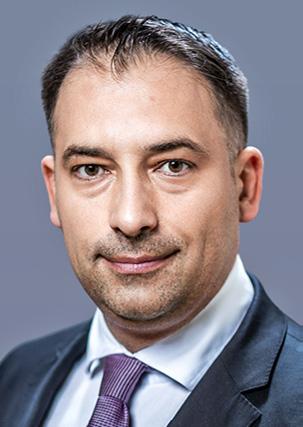
Smart grids are rapidly becoming the backbone of modern electricity networks. The integration of digital communication and control technologies enables smart grids to optimize electricity generation, distribution, and consumption.
However, the increased use of digital technologies and the massive amounts of data generated also raises serious concerns about data security. This article will explore the data security concerns around smart grids.
What is a Smart Grid?
Smart grids integrate a wide range of technologies, such as sensors, meters, and automation systems, that enable real-time monitoring and control of the grid. They also allow two-way communication between electricity providers and consumers, enabling consumers to manage their energy consumption better and participate in demand-response programs.
Data Security Concerns on Smart Grids
Smart grids generate massive amounts of data that can be highly sensitive and valuable. This includes information about energy consumption, production, and distribution, as well as about the state of the grid, such as voltage and frequency. This data can be used to optimize the grid’s performance and improve energy efficiency. However, the same data could also be used by malicious actors for nefarious purposes such as hacking, data theft, and cyber-attacks. The following are some of the data security concerns about smart grids.
Cybersecurity Threats
Smart grids are vulnerable to cybersecurity threats like hacking, malware, and denial-of-service attacks. Hackers could exploit vulnerabilities in smart grid devices and systems to gain unauthorized access to the grid and steal sensitive data. Malware can be used to disrupt the operation of the grid, causing power outages and other disruptions. Denial-of-service attacks can overload the grid with traffic, making it difficult to manage and control.
Privacy Concerns
Smart grids generate a vast amount of data about energy consumption, which can reveal sensitive information about consumers’ daily habits and routines. This information could be used to infer personal details such as when someone is home, what appliances they use, and their daily routines. This could be valuable to third-party companies for targeted advertising or other purposes, but malicious actors could also use it for identity theft and other criminal activities.
Data Protection
Smart grids are subject to various data protection regulations, including the General Data Protection Regulation (GDPR) in Europe and the California Consumer Privacy Act (CCPA) in the United States. These regulations require electricity providers to ensure that the data generated by smart grids is protected and used only for legitimate purposes. Failure to comply with these regulations can result in significant fines and reputational damage.
Legacy Systems
Smart grids are often built on top of legacy systems that were not designed with cybersecurity in mind. These legacy systems can be vulnerable to cyberattacks and provide a pathway for hackers to access the smart grid. Integrating legacy systems with modern smart grid technologies can also create vulnerabilities that malicious actors can exploit.
Supply Chain Risks
Smart grids rely on a complex supply chain that includes a wide range of components and systems, from sensors and meters to communication networks and control systems. Each of these components represents a potential vulnerability that hackers can exploit. Electricity providers must ensure that their suppliers and vendors follow best practices for cybersecurity and data protection to minimize these risks.
Smart grids are an essential component of modern electricity networks, enabling the optimization of energy generation, distribution, and consumption. However, the increased use of digital technologies and the massive amounts of data generated by smart grids also raises serious concerns about data security. Electricity providers need to take a proactive approach to data security and implement robust cybersecurity and data protection measures to minimize the risks of cyberattacks.
Our experience is that being in the office ensures more effective professional development and collaboration and provides social connectivity.
GK: The needs and expectations of Gen Z have indeed influenced how we work. While our office approach remains essential for the specialized nature of the legal market, we recognize the importance of flexibility. Gen Z has expressed a desire for personalized mentoring and training, and we strive to balance this with a flexible work environment.
István Szatmáry: The needs and expectations of Gen Z are changing the way we work and the way we organize work. We should also consider the post-COVID reality. It is yet to be seen what impact this will have on our daily routine, but employers must take a very flexible approach regarding applicable working methods. There is no “one size fits all” solution, and the more sophisticated the approach you take in connection with your employees, the
more chance you have to (re-)invent new working standards that are satisfactory for people in different positions. We also see the need for inclusion: our colleagues want to be actively involved in the discussion on these topics, and we encourage them to have a say.
KSz: Gen Z shares the mutual experience of online high-school education because of COVID restrictions. This affects their attitude and expectation for university education or workplace conditions. We provide the possibility of hybrid work, but we want our lawyers to spend a few days in the office every week. Of course, if justified, fully remote work can be arranged for shorter periods.
BBJ: Do you have any concerns about maintaining the legal talent pipeline? Are there enough students studying law?

CsT: The search for new talents is quite difficult, but at Bird & Bird, several colleagues are teaching the practical aspects of the legal profession at universities, and the Dr. Nagy László Magánjogi Érvelési Verseny is our regular event. This moot competition allows law students to show their legal reasoning skills in reallife situations and compare their talents in a professionally wellprepared and playful competition. The competition is also an opportunity to honor the memory of a brilliant lawyer, Dr. László Nagy, who died young in 2013.
EP: The legal talent pipeline in Hungary is well-established, with many talented, committed, and enthusiastic young professionals. However, competition for these candidates is extreme. We want to contribute to helping legal talent, which is why we regard our collaboration with universities and student associations as very important.
12 | 3 Special Report www.bbj.hu Budapest Business Journal | June 2 – June 15, 2023
INSIDE VIEW
www.bslaw.hu
NOTE: ALL ARTICLES MARKED INSIDE VIEW ARE PAID PROMOTIONAL CONTENT FOR WHICH THE BUDAPEST BUSINESS JOURNAL DOES NOT TAKE RESPONSIBILITY
Erika Papp
Continued from page 11 ›››
Gábor Király
István Szatmáry
ÁF: Thanks to our intern program, our pipeline is always healthy, and we have not faced any difficulties recently. We do our best to stay connected with law students. One of the best platforms for this is our award-winning competition, The New Lawyer Challenge. Law students have to leave their comfort zone and deal with practical challenges and new areas, and the winners get the opportunity
to intern with us. In addition, we support ELTE’s highly successful team for the Jessup International Law Moot Court every year.
KF: In terms of Hungary’s legal education, as it has been voiced for several years, it would be timely to move the focus from theoretical teaching towards more practical knowledge transfer and more training in practice. This would substantially enhance the new graduates’ understanding of the legal professional work they will be asked to perform at actual workplaces. From our side, we help university students gain the necessary insight into our work through our paralegal program, which also helps with the early identification of talent for our firm.
ISz: It has never been a question that there are enough students studying law; the real question is how you identify legal talent early enough and how you attract them to your brand. This requires more intense use of informal channels than at any time before. Once you have identified and hired young and talented lawyers, the next challenge is to keep them motivated. In the 21st century, motivation is not only about remuneration; it is much more about the working environment you offer, and it is very connected to how you organize work and the overall office climate. Treating your team fairly and equitably under challenging situations also matters. Even if you have to pass
hard decisions, fair treatment is a must. You can only earn trust if you are self-reflexive enough to consider views other than yours. The focal point of Oppenheim’s approach is to identify talent at an early stage and to offer a long-term career model. We have partners at the firm who started their practice as trainee students and remained after graduation. ASz: We have more than enough law students and too many lawyers. If you consider Austria has 9,000 lawyers, Hungary, with 18,000 lawyers, has a very high number proportionally while our economy, on the other hand, is not as strong. In general, the legal education is good; however, it’s still difficult to find fully educated professionals with
a genuine interest in the profession, adequate language skills, and the correct set of qualities to work with clients. We cannot accept an average candidate to serve our attractive international clientele. We offer exciting legal work for young lawyers; in return, we go through a strict process of filtering out the best from the wide selection.
ZF: There has never been a question of quantity but rather quality. It has always been a challenging task to spot the talented ones, but by following our HR strategy and utilizing our positive market reputation, we can attract the best-in-class young talents. Our headcount is also very stable for many years now, with hardly any fluctuation in our team.
Our 2023 Legal Market Talk Panel
• Csongor Tompa, head of banking and finance and capital markets, Bird & Bird Hungary.
• Erika Papp, managing partner, CMS Hungary.
• Gábor Király, managing partner, Dentons Réczicza Law Firm.

• Ákos Fehérváry, Budapest office managing partner, Hegymegi-Barakonyi and Partner Baker & McKenzie Attorneys-at-Law.
From Legal Startup to Market-leading Independent Law Firm: 15 Years of HP Legal
Established in 2008, HP Legal has proudly completed 15 years of unwavering commitment to excellence in legal services. As we celebrate this significant milestone, we should look back and appreciate the journey that has led to our firm’s success, from humble beginnings to becoming a sought-after, market-leading independent business law advisory powerhouse in Hungary.
Since the 1990s, there has been a significant presence of international law firms in Hungary with the required knowledge and experience in finance and corporate transactions. However, over the past 15 years or so, a new generation of local lawyers has grown up, creating independent law firms that have evolved to supplement or replace those international firms, demonstrating the capability to provide legal services at a comparable, or even better, level. It is important to recognize the continuing success of independent Hungarian law firms, which in turn contributes to the success
of the Hungarian economy. Our firm, HP Legal, is one of those critical, independent players. With a growing reputation for diligence, integrity, and professionalism, HP Legal quickly expanded its reach and expertise. Combined with an unwavering commitment to client service and innovative legal solutions, the firm has continued to succeed. It now includes several talented attorneys, all striving to deliver exceptional legal services for the benefit of their clients. As a result, HP Legal is ranked among the top law firms in the country by numerous international and prestigious legal publications, with our partners consistently featuring in the list of top attorneys in their respective fields. We regularly cooperate with international law firms, working with their European, U.K. and U.S. offices, allowing us to contribute to significant local and international transactions.
In the face of the unprecedented challenges of recent years, HP Legal has demonstrated resilience and adaptability. As businesses and individuals faced legal complexities during the pandemic, the firm provided valuable guidance and support to clients to help them navigate these turbulent times. We quickly adapted to remote working and online solutions, seamlessly transitioning to digital platforms to maintain uninterrupted services.
The main focus of our legal advisory services is the negotiation and execution of domestic and cross-border business transactions, exploiting our extensive expertise and experience in banking, project finance, capital markets, M&A, private equity, corporate, real estate and commercial law. As a result, our lawyers have participated in the most prominent

• Kristóf Ferenczi, managing partner, Kinstellar Budapest
• István Szatmáry, partner, Oppenheim Legal.
• Katalin Szamosi, managing partner, SBGK Attorneys at Law and Patent Attorneys.
• András Szecskay, founder and named partner, Szecskay Attorneys at Law.
• Zoltán Faludi, managing partner, Wolf Theiss Budapest.
Hungarian infrastructure and greenfield projects, acquisitions, export finance, and real estate transactions, garnering a deserved recognition and reputation for excellence.
Our clients include the largest Hungarian financial institutions and corporate groups, as well as international companies, private equity firms and real estate funds. Our extensive network of connections with foreign law firms ensures we can provide services of the highest standards, flexibly and proactively, to meet and exceed the demands of clients locally and in other jurisdictions.
As HP Legal celebrates its 15th anniversary, the firm looks forward to a bright future marked by continued growth and innovation in the legal sector. With a commitment to embracing cutting-edge technology and adapting to the ever-changing legal landscape, HP Legal is poised to remain at the forefront of providing exceptional, client-focused legal services. The firm’s unwavering dedication to upholding its core values and nurturing talent will ensure its ongoing success and enduring legacy in the years to come. We see across Europe that strong, independent local firms have become an integral and vital part of the legal market, competing with global law firms. Our objective for the next 15 years is to remain a strong independent law firm, enhance our reputation and service offering, and, most importantly, continue to safeguard our clients’ interests at home and abroad.
3 Special Report | 13 www.bbj.hu Budapest Business Journal | June 2 – June 15, 2023
PROMOTION
Ákos Fehérváry
Hungarian Implementation of the EU Whistleblowing Directive
the internal whistleblowing channel to specialist protection attorneys or thirdparty organizations is permissible. However, the responsibility for operating the hotline always remains with the employer.
Requirements Regarding Reporting
On 23 May 2023, the Hungarian Parliament adopted its longawaited Whistleblower Protection Act to implement the EU Whistleblowing Directive (EU 2019/1937). The directive aims to improve protection for whistleblowers across Europe by requiring companies to set up internal reporting channels.
For the most part, the Whistleblower Protection Act implements the directive’s provisions, but in some points, it deviates from or goes further than the EU outline.
Number of Employees or Area of Business
The Whistleblower Protection Act obliges employers with at least 50 employees to set up internal reporting channels. Based on the act, hired workers and contractors are also regarded as employees. Furthermore, companies in particular business areas must set up a hotline regardless of their number of employees. This includes credit institutions, financial services companies, auditors, bookkeepers, tax advisors, law firms, firms carrying out activities related to real estate transactions, and companies in the oil and gas sector. Companies with 50-249 employees are permitted to share resources through a joint internal reporting hotline.
Whistleblowers and their Subjects
A whistleblowing report may be made, among others, by prospective, current, or former employees, volunteers at the company, or by contractors, subcontractors, or suppliers having a contractual relationship with the company. Businesses have no obligation to investigate anonymous tips. The internal reporting channels must be available for any unlawful or allegedly unlawful activities or omissions. The reporting person must not suffer any adverse measures (such as termination of employment) due to their whistleblowing.
Organizational Requirements
An independent and competent person or department must operate the whistleblowing hotline. Outsourcing

The Whistleblower Protection Act contains several mandatory procedural requirements for operating internal reporting channels. Among other things, companies are obliged to offer the option of whistleblowing in writing or verbally, maintain the confidentiality of the whistleblower and the person affected by the whistleblowing, comply with documentation obligations, take follow-up measures (for example, conducting an internal investigation or forwarding the information to the authorities), and give feedback to whistleblowers on the outcome of the investigation. Furthermore, a policy on the operation of the internal reporting channel is to be prepared and communicated.
Data Protection Requirements
Operating internal reporting involves processing the personal data of both the reporting person and the person affected by the whistleblowing. The company operating the internal channel must, as a data controller, prepare and communicate a privacy notice on the data processing. This must also be included in the company’s register of data processing activities.
The Whistleblower Protection Act strictly limits the recipients to whom the personal data can be transferred and the deletion obligations of the controller. Special rules apply to the transfer of personal data to non-EU countries.
Effect of the Act
The Whistleblower Protection Act enters into force 60 days after its publication (which has not yet occurred). At the moment, we envisage that the systems will have to be in operation as of the end of July 2023.
The act contains a grace period for companies with 50-249 employees, which are obliged to operate the internal reporting channel based on the number of their employees and not on their particular activities. The obligation to establish a reporting channel would only apply to them from December 17, 2023.
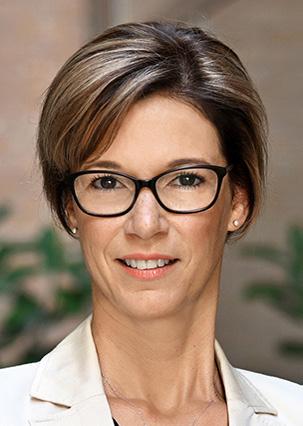
Officers of the National Tax and Customs Administration (NAV) confiscated pharmaceutical ampoules worth almost HUF 8 million during an inspection of a truck with a German license plate on the M5 highway, the customs office announced on its Facebook page on May 24. The ampoules contained an antiperspirant and anti-wrinkle product and were hidden in a food storage box. According to its transport document, the truck was transporting car parts from Turkey to Germany. An expert at the National Institute of Pharmaceutical and Food Health (Ogyéi) said the preparations require a prescription in Hungary, and the driver had an unreasonable amount of them. The prescription medicines were seized, and proceedings were initiated on suspicion of drug law enforcement violations.
Secretary Bence Rétvari told state news agency MTI on May 23. Hungary decided on the release of 808 people smugglers, primarily nationals of neighboring countries, Rétvari said. He pointed out that their release is not an expungement of their crimes and said they have 72 hours to leave the country or face re-arrest. Brussels “owes Hungary” HUF 650 billion, or more than EUR 1.5 bln, for the country’s expenditures on protecting its border and the European Union frontier since 2015, Rétvari said. Hungary has recouped just 1% of that spending so far, he added. The work of Hungarian police and border patrols to catch human smugglers, who are then penalized in Hungary, ensures the security of people in the rest of Europe as well as in Hungary, he said.
Nearly 49,000 Border Violators Stopped This Year
Hungarians Demonstrate Against ‘Revenge Law’
Thousands of Hungarians rallied in Budapest on May 19 to protest against new legislation that would eliminate the public servant status of teachers, as well as police tear-gassing of teenagers during a previous demonstration, according to international news wire Reuters. The protest came after a series of rallies and strikes for higher salaries and better working conditions for teachers. Protesters also marched on May 19 against the new so-called Status Law that would significantly increase teachers’ workload. Critics refer to the legislation as the “Revenge Law,” as they perceive it as punishment for teachers’ year-long resistance. The government said the bill aims to improve the quality of education. Almost 5,000 teachers have already said they will leave their profession if the Status Law comes into force.
Border Protection Costs Drive Release of Human Smugglers
Hungary’s government had to decide on the release from prison of human smugglers because Brussels is not contributing to the cost of border protection while sanctioning the country for prison overcrowding, State
Nearly 49,000 border violators and 387 human smugglers have been stopped in Hungary this year, the prime minister’s chief domestic security advisor György Bakondi told Kossuth Rádió on May 21. Bakondi said migrants and human smugglers had kept Hungary’s borders under significant pressure. Some 12% of prisoners in Hungary are in jail due to human smuggling, totaling 2,048 people from 73 countries. “They are the people on the edges, the real big criminals who are the movers of the networks don’t come even close to the border, and they cannot be caught,” Bakondi noted. Action against human smuggling imposes sizeable burdens on the Hungarian state, the advisor added.
Legal Relationship of Undeclared Workers Settled
Since the amendment of the law in March 2021, the legal relationship of more than 14,000 undeclared workers has been settled with the effective cooperation of the employment supervisory authority, State Secretary for Employment Policy Sándor Czomba of the Ministry of Economic Development announced on May 18, according to profitline.hu. Czomba recalled that the Parliament had previously reviewed and renewed the rules of labor inspection at the government’s initiative. Under this, after discovering a violation, the authority obliged the employer to notify the employee affected by the irregularity that they would be taken onto the payroll at the current minimum wage. The measure regulates the legal relationship of those who live from work, so they become entitled to more social security benefits, and their service time, which is the basis for pension calculation, is also extended.

14 | 3 Special Report www.bbj.hu Budapest Business Journal | June 2 – June 15, 2023
INSIDE VIEW
www.noerr.com NOTE: ALL ARTICLES MARKED INSIDE VIEW ARE PAID PROMOTIONAL CONTENT FOR WHICH THE BUDAPEST BUSINESS JOURNAL DOES NOT TAKE RESPONSIBILITY in
Noerr and Partners Law Firm Legal
Dr. Edina Czeglédy Counsel
Brief News
Photo by Olivier Le Moal / Shutterstock.com
NAV Confiscates HUF 8 mln in Pharmaceutical Ampoules
The U.K. may Have Left the EU, but English Law Still has a Significant Role to Play Here
The Budapest Business Journal sat down with Anikó Kircsi, partner and head of corporate/M&A at CMS Budapest, and Eszter Török, senior counsel in the corporate/ M&A and finance departments, to discuss how the law firm can help large local businesses with English legal issues to support investments in the CEE region.

BBJ: How common is it for large local investors to encounter English law issues?
Anikó Kircsi: Large local investors may well come across English law issues in Hungary. First, in many M&A transactions where the seller and the buyer are from different countries, the parties choose to specify English law as the governing law of the contract. Also, large multinationals outside Hungary may have their standard supply agreements subject to English law, and the local entities as purchasers may not have any choice in this case.
Eszter Török: A third example comes to mind when a local entity takes a loan from a sizeable consortium of international banks. In these financing transactions, we also see that lenders often prefer English law for the financing contract.

BBJ: English law is based on Common Law and precedent, whereas Hungarian (and European) law has its roots in Roman law. How hard is it to make the two compatible?
AK: Yes, there are significant differences. You would be surprised, however, by how many similar concepts we also come across. The notion of the freedom
of contract is fundamental in both Hungarian and English law (of course, there are exceptions), and this is what forms the basis for a lot of our work. Interestingly, the typical structure of English law contracts has become the norm in other jurisdictions; even non-English law contracts of complex M&A transactions now tend to follow English law templates and include specific English law concepts such as warranties, indemnities or break fees.
ET: Indeed, both legal systems allow the parties to record the terms of their agreement freely; during that process, of course, our lawyers will ensure that the specific terms of the contract are compatible with the peculiarities of English or Hungarian law.
AK: One particular example comes to mind: a mandatory Hungarian act says certain types of contracts involving state-owned assets must be subject to Hungarian law and set out in Hungarian. So, of course, when this applies, we have to advise our clients to respect this.
BBJ: Any discussion involving the United Kingdom and EU member states inevitably defaults to Brexit sooner or later. Has that made matters even more complicated?
ET: Yes, there were a lot of discussions on this topic during the transitional period in 2020, as neither the market players nor the advisors knew how, exactly, the various international treaties would be changed after Brexit. Ultimately, it turned out that Brexit has made little practical difference to our work. It is still very much possible and practicable to agree on English
law in both cross-border M&A and financing deals, and the courts in both the United Kingdom and Hungary will continue to accept the parties’ agreement on this, provided, of course, that the contract is worded correctly.
BBJ: What can CMS Budapest bring to the table in these matters that set it aside from your competitors?
AK: Of course, there are several international law firms in Budapest with sizeable offices in London who can advise clients on English law issues where needed. At CMS, we provide the same assistance locally. In addition to Eszter, a dual U.K.Hungarian qualified senior counsel, we have several additional lawyers on our team who are qualified in non-Hungarian jurisdictions. This means that, in addition to local law advice, we can provide English law advice in Hungarian.
ET: And while price is not everything, I think in the current economic climate, we should mention that when we give English law advice here in Budapest, we use our local rates, not those of our London colleagues!
BBJ: In which sectors do you most often come across English legal issues?
AK: In addition to significant company acquisitions and financing deals, we tend to come across English law issues in the IT sector and with clients for whom we run a so-called managed legal service. Broadly, this is where we assist the in-house legal team of a large multinational company by taking care of all their day-to-
day routine work, such as low-value contracts, which allows the in-house lawyers to focus on their strategic, more complex projects. The work we do there tends to involve contracts under English law (and occasionally other jurisdictions); we provide this service for a fixed monthly fee.
BBJ: Do you see areas of potential growth for transactions in CEE where English legal issues are involved?
ET: We see a number of wealthy local investors eyeing investment opportunities in other CEE countries. When these opportunities materialize, we may well see the need for English law advice if the parties choose to apply the law of a neutral state. Interestingly, some of the largest Hungarian companies are also looking at the fast-growing region of Central Asia as a further investment opportunity. OTP, for example, recently purchased the fifth-largest bank in Uzbekistan.
BBJ: Is there anything else to add?
ET: One thing we have not yet mentioned is that a lot of clients prefer to agree on arbitration in their contracts instead of ordinary courts. This is, of course, possible and we see a lot of this arrangement, with the parties agreeing on English law and arbitration.
AK: Yes, we usually support our clients in this choice. For example, we have found that the London Court of International Arbitration (LCIA) offers a flexible and impartial administration of arbitration, regardless of whether the agreement is under English or Hungarian law.
3 Special Report | 15 www.bbj.hu Budapest Business Journal | June 2 – June 15, 2023
ROBIN MARSHALL
PRESENTED CONTENT
Eszter Török
Anikó Kircsi
Top-ranked Law Firms
BELOW IS THE LIST OF LAW FIRMS WITH INTERNATIONAL AFFILIATIONS OPERATING IN HUNGARY THAT HAVE BEEN RECOMMENDED IN THE MOST AREAS OF LEGAL ACTIVITIES IN 2023 (IN TOP CATEGORIES OF VARIOUS RANKING BODIES, E.G. BAND 1 WITH CHAMBERS EUROPE AND CHAMBERS GLOBAL AND TIER 1 WITH LEGAL 500 ). THE CHARTS OF THE TOP - RANKED LAW FIRMS DO NOT INCLUDE IFLR DATA THIS YEAR, BECAUSE IT WILL BECOME AVAILABLE ONLY AFTER OUR PRINT DEADLINE. PLEASE LOOK FOR AN UPDATED VERSION OF THE SUMMARY OF THE CHARTS IN THE 2023 -2024 EDITION OF THE BOOK OF LISTS, DUE OUT THIS FALL.
16 | 3 Special Report www.bbj.hu Budapest Business Journal | June 2 – June 15, 2023
CHAMBERS GLOBAL 2023 BAND 1 CHAMBERS EUROPE 2023 BAND 1 LEGAL 500 2023 TIER 1 TOTAL NUMBER OF RECOMMENDATIONS CMS 3 7 10 20 DLA PIPER HUNGARY 2 3 8 13 DENTONS 1 3 6 10 HEGYMEGI-BARAKONYI AND PARTNER BAKER & MCKENZIE ATTORNEYS-AT-LAW – 3 6 9 LAKATOS, KÖVES AND PARTNERS – 1 8 9 ANDRÉKÓ FERENCZI KINSTELLAR 1 2 5 8
Top-ranked Law Firms
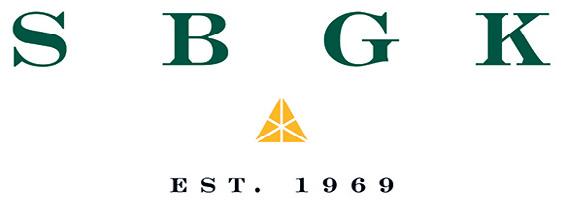

3 Special Report | 17 www.bbj.hu Budapest Business Journal | June 2 – June 15, 2023
CHAMBERS GLOBAL 2023 BAND 1 CHAMBERS EUROPE 2023 BAND 1 LEGAL 500 2023 TIER 1 TOTAL NUMBER OF RECOMMENDATIONS SZECSKAY ATTORNEYS AT LAW 1 2 3 6 SIEGLER BIRD & BIRD ÜGYVÉDI IRODA – – 4 4 OPPENHEIM – – 3 3 JALSOVSZKY – 1 1 2 NAGY & TRÓCSÁNYI – – 2 2 SBGK ATTORNEYS AT LAW – 1 1 2 WOLF THEISS BUDAPEST – 1 1 2 ALLEN & OVERY KÁDÁR – – 1 1 VÁMOSI-NAGY ERNST & YOUNG LAW OFFICE – – 1 1 VJT & PARTNERS – – 1 1
LEGAL ACTIVITIES
Banking & Finance
CHAMBERS GLOBAL 2023
Competition / Antitrust
Corporate / M&A
BAND 1
Andrékó Ferenczi Kinstellar
Hegymegi-Barakonyi
CHAMBERS EUROPE 2023
BAND 2
CMS DLA Piper Hungary Dentons Lakatos, Köves & Partners
CMS Hegymegi-Barakonyi and Partner Baker & McKenzie Attorneys-at-Law
CMS Dentons DLA Piper Hungary
Dentons DLA Piper Hungary Lakatos, Köves & Partners
Andrékó Ferenczi Kinstellar
Lakatos, Köves & Partners
Siegler Bird & Bird Ügyvédi Iroda
BAND 3
Allen & Overy Kádár
Hegymegi-Barakonyi and Partner Baker & McKenzie Attorneys-at-Law
Siegler Bird & Bird Ügyvédi Iroda
Szecskay Attorneys at Law
Allen & Overy Kádár
Andrékó Ferenczi Kinstellar
Oppenheim
Schoenherr Hetényi Attorneys at Law
Szecskay Attorneys at Law
Hegymegi-Barakonyi and Partner Baker & McKenzie Attorneys-at-Law
Oppenheim
Szecskay Attorneys at Law
Wolf Theiss Budapest
Dispute resolution
CMS Szecskay Attorneys at Law
Employment Hegymegi-Barakonyi and Partner Baker & McKenzie Attorneys-at-Law
Intellectual property
SBGK Attorneys at Law Szecskay Attorneys at Law
DLA Piper Hungary Lakatos, Köves & Partners Nagy & Trócsányi
Oppenheim
Siegler Bird & Bird Ügyvédi Iroda
CMS DLA Piper Hungary Pál és Kozma Ügyvédi Iroda Szecskay Attorneys at Law VJT & Partners
CMS Danubia Legal Oppenheim Siegler Bird & Bird Ügyvédi Iroda
Bittera, Kohlrusz &Tóth Gárdos Mosonyi Tomori LFB
Oppenheim
Hegymegi-Barakonyi and Partner Baker & McKenzie Attorneys-at-Law
Piper Hungary Jalsovszky
and Partner Baker & McKenzie Attorneys-at-Law
Ernst & Young Law Office
18 | 3 Special Report www.bbj.hu Budapest Business Journal | June 2 – June 15, 2023
CMS
CLV
Projects and energy Andrékó
CMS Dentons
Oppenheim Real estate CMS Dentons DLA
Hegymegi-Barakonyi
Tax DLA
CMS
TMT CMS Dentons Lakatos, Köves & Partners DLA Piper
VJT
Siegler
Szecskay Attorneys at Law
Life sciences
Hegymegi-Barakonyi and Partner Baker & McKenzie Attorneys-at-Law Szecskay Attorneys at Law
Partners KNP Law Nagy-Koppány & Lencs
Ferenczi Kinstellar Wolf Theiss Budapest
DLA Piper Hungary
Piper Hungary
and Partner Baker & McKenzie Attorneys-at-Law Lakatos, Köves & Partners Andrékó Ferenczi Kinstellar CERHA HEMPEL Dezső & Partners Oppenheim Szécsényi and Partners
Hegymegi-Barakonyi
Vámosi-Nagy
Wolf Theiss Budapest
Hungary
& Partners
Bird & Bird Ügyvédi Iroda
LEGAL ACTIVITIES BAND 1 BAND 2 BAND 3 BAND 4 Banking & Finance Andrékó Ferenczi Kinstellar CMS DLA Piper Hungary Dentons Lakatos, Köves & Partners Allen &
Kádár Hegymegi-Barakonyi
McKenzie Attorneys-at-Law Siegler Bird
Bird Ügyvédi Iroda Szecskay Attorneys at Law Gárdos,
HP Legal
Corporate/M&A CMS Dentons DLA Piper Hungary
Ferenczi Kinstellar
Köves & Partners
Bird & Bird Ügyvédi Iroda
Overy
and Partner Baker &
&
Mosonyi, Tomori
Hajdu & Partner Law Office Jalsovszky Noerr Schoenherr Hetényi Attorneys at Law Vámosi-Nagy Ernst & Young Law Office Wolf Theiss Budapest
Andrékó
Lakatos,
Siegler
Dispute resolution CMS Szecskay Attorneys at Law
and Partner Baker & McKenzie Attorneys-at-Law Oppenheim Szecskay Attorneys at Law Wolf Theiss Budapest Allen & Overy Kádár Schoenherr Hetényi Attorneys at Law
DLA Piper Hungary Lakatos, Köves & Partners Nagy és Trócsányi Oppenheim Siegler Bird & Bird Ügyvédi Iroda Bittera, Kohlrusz & Tóth LFB
Banking, finance and capital markets
LEGAL 500 2023
Gárdos Mosonyi Tomori
CERHA HEMPEL Dezső & Partners
Competition
Commercial, Corporate & M&A
Allen & Overy Kádár
Andrékó Ferenczi Kinstellar
Piper Hungary
Lakatos, Köves & Partners
Siegler Bird & Bird Ügyvédi Iroda
Andrékó Ferenczi Kinstellar CMS Dentons DLA Piper Hungary
Hegymegi-Barakonyi and Partner Baker & McKenzie Attorneys-at-Law
Lakatos, Köves & Partners
Andrékó Ferenczi Kinstellar
CMS
Dentons DLA Piper Hungary
Hegymegi-Barakonyi and Partner Baker & McKenzie Attorneys-at-Law
Lakatos, Köves & Partners
Oppenheim
Siegler Bird & Bird Ügyvédi Iroda
Andrékó Ferenczi Kinstellar
CMS
Data privacy and data protection
Dentons Lakatos, Köves & Partners
CMS
DLA Piper Hungary
Lakatos, Köves & Partners
Dispute resolution
Nagy & Trócsányi Oppenheim
Szecskay Attorneys at Law
Hegymegi-Barakonyi and Partner Baker & McKenzie Attorneys-at-Law Jalsovszky Kapolyi Law Firm Noerr
Partos & Noblet / Hogan Lovells
Schoenherr Hetényi Attorneys at Law
Szecskay Attorneys at Law Wolf Theiss Budapest
Allen & Overy Kádár Bassola Law Firm
CERHA HEMPEL Dezső & Partners
Schoenherr Hetényi Attorneys at Law
Siegler Bird & Bird Ügyvédi Iroda
Szecskay Attorneys at Law
Allen & Overy Kádár
Forgó, Damjanovic & Partners Noerr
Partos & Noblet / Hogan Lovells
Schoenherr Hetényi Attorneys at Law
Szecskay Attorneys at Law
VJT & Partners
Wolf Theiss Budapest
Deloitte Legal Göndöcz and Partners Law Firm
Hegymegi-Barakonyi and Partner Baker & McKenzie
Attorneys-at-Law
Siegler Bird & Bird Ügyvédi Iroda
Taylor Wessing Hungary
VJT & Partners
CERHA HEMPEL Dezső & Partners
Dentons
Forgó, Damjanovic & Partners
Gárdos Mosonyi Tomori
LFB – László Fekete Bagaméry
Siegler Bird & Bird Ügyvédi Iroda
Wolf Theiss Budapest
Deloitte Legal Göndöcz and Partners Law Firm
| KATONA Ügyvédi Társulás Forgó, Damjanovic & Partners HP Legal | Hajdu & Partners Moore Legal Kovács Nagy & Trócsányi Oppenheim
Szabó, Kelemen & Partners Andersen Attorneys Vámosi-Nagy Ernst & Young Law Office
Deloitte Legal Göndöcz and Partners Law Firm
Forgó, Damjanovic & Partners
KPMG Legal Tóásó Law Firm
Oppenheim
Partos & Noblet / Hogan Lovells
Réti, Várszegi and Partners PwC Legal
Szabó, Kelemen & Partners Andersen Attorneys
VJT & Partners
CERHA HEMPEL Dezső & Partners
Deloitte Legal Göndöcz and Partners Law Firm
Jalsovszky
Kapolyi Law Firm
KPMG Legal Tóásó Law Firm
Nagy & Trócsányi
Szabó, Kelemen & Partners Andersen Attorneys
CERHA HEMPEL Dezső & Partners
DLA Piper Hungary
KPMG Legal Tóásó Law Firm
Noerr
Oppenheim
Réti, Várszegi and Partners PwC Legal
SBGK Attorneys at Law
Schoenherr Hetényi Attorneys at Law
Wolf Theiss Budapest
Allen & Overy Kádár
Hegymegi-Barakonyi and Partner Baker & McKenzie Attorneys-at-Law
Kapolyi Law Firm
Lohn Law Firm
Partos & Noblet / Hogan Lovells
Réti, Várszegi and Partners PwC Legal
Sándor Szegedi Szent-Ivány Komáromi Eversheds Sutherland Schoenherr Hetényi Attorneys at Law
Szabó, Kelemen & Partners Andersen Attorneys
VJT & Partners
bnt | attorneys-at-law
CLV Partners - Csabai & Partners Law Firm
Deloitte Legal Göndöcz and Partners Law Firm
Employment
Intellectual property
CMS DLA Piper Hungary Hegymegi-Barakonyi and Partner Baker & McKenzie Attorneys-at-Law
Szecskay Attorneys at Law
VJT & Partners
Hegymegi-Barakonyi and Partner Baker & McKenzie Attorneys-at-Law Oppenheim
SBGK Attorneys at Law
Siegler Bird & Bird Ügyvédi Iroda
Szecskay Attorneys at Law
Andrékó Ferenczi Kinstellar
Forgó, Damjanovic & Partners
KCG Partners Law Firm
Lakatos, Köves & Partners Oppenheim
CMS Danubia Legal Dentons
DLA Piper Hungary
Lakatos, Köves & Partners
Dentons Noerr
Partos & Noblet / Hogan Lovells
Sándor Szegedi Szent-Ivány Komáromi Eversheds Sutherland
Schoenherr Hetényi Attorneys at Law
Siegler Bird & Bird Ügyvédi Iroda
Szabó, Kelemen & Partners Andersen Attorneys
TaylorWessing Hungary
Vámosi-Nagy Ernst & Young Law Office
Wolf Theiss Budapest
Schoenherr Hetényi Attorneys at Law
Wolf Theiss Budapest
Projects and energy
Real estate & construction
Andrékó Ferenczi Kinstellar CMS Dentons DLA Piper Hungary
Lakatos, Köves & Partners
Siegler Bird & Bird Ügyvédi Iroda
Wolf Theiss Budapest
CMS Dentons Hegymegi-Barakonyi and Partner Baker & McKenzie Attorneys-at-Law
Lakatos, Köves & Partners
Piper Hungary Hegymegi-Barakonyi and Partner Baker & McKenzie Attorneys-at-Law Jalsovszky Nagy & Trócsányi
Vámosi-Nagy Ernst & Young Law Office
Hegymegi-Barakonyi and Partner Baker & McKenzie Attorneys-at-Law
HP Legal | Hajdu & Partners Réti, Várszegi and Partners PwC Legal
Schoenherr Hetényi Attorneys at Law
Andrékó Ferenczi Kinstellar
Deloitte Legal Göndöcz and Partners Law Firm
DLA Piper Hungary Kapolyi Law Firm Noerr
Oppenheim
Partos & Noblet / Hogan Lovells
Siegler Bird & Bird Ügyvédi Iroda
Andrékó Ferenczi Kinstellar
Deloitte Legal Göndöcz and Partners Law Firm
Dentons
Hegymegi-Barakonyi and Partner Baker & McKenzie Attorneys-at-Law
Siegler Bird & Bird Ügyvédi Iroda
VJT & Partners
Wolf Theiss Budapest
Deloitte Legal Göndöcz and Partners Law Firm
KCG Partners Law Firm
Lakatos, Köves & Partners
LFB – László Fekete Bagaméry
Réti, Várszegi and Partners PwC Legal
Szecskay Attorneys at Law
Wolf Theiss Budapest
CERHA HEMPEL Dezső & Partners
Deloitte Legal Göndöcz and Partners Law Firm
Forgó, Damjanovic & Partners
KCG Partners Law Firm
Oppenheim
Szabó, Kelemen & Partners Andersen Attorneys
Szecskay Attorneys at Law
CERHA HEMPEL Dezső & Partners Jalsovszky
KCG Partners Law Firm
Lohn Law Firm
Réti, Várszegi and Partners PwC Legal
Schoenherr Hetényi Attorneys at Law
Szabó, Kelemen & Partners Andersen Attorneys
Szecskay Attorneys at Law
Szécsényi and Partners
Wolf Theiss Budapest
Allen & Overy Kádár
Forgó, Damjanovic & Partners
Partos & Noblet / Hogan Lovells
Szecskay Attorneys at Law
3 Special Report | 19 www.bbj.hu Budapest Business Journal | June 2 – June 15, 2023
ACTIVITIES
1
2
3
LEGAL
TIER
TIER
TIER
CMS Dentons DLA
ERDŐS
Technology, Media, Telecommunications CMS DLA Piper Hungary Lakatos, Köves
& Partners
Tax CMS DLA
Levente Hegedűs Promoted to Partner at Kinstellar
Law firm Kinstellar has announced the promotion of Levente Hegedűs to partner at its Budapest office.
Hegedűs joined Kinstellar as a legal intern in 2008 and became counsel in 2019. During his career, Hegedűs has been consistently ranked and recognized by international legal directories as a leading lawyer in his field. In recent editions, he has been singled out by clients as ‘‘a very experienced lawyer in the field of complex financing structures’’ and as an ‘‘outstanding lawyer,’’ Kinstellar tells the Budapest Business Journal.
The promotion to partner was one of a number the law firm announced on May 3 across its member offices in Bratislava, Istanbul, and Kyiv, in addition to Budapest.
As a result of the accession, Niveus Legal | Halmos and Jánosi Law Firm has been established as a partnership. The law firm works in close cooperation with all the member companies of the Niveus group, providing clients with in-house access to tax, accounting, transfer pricing, auditing, and advisory services in various strategic areas.
Zoltán Jánosi graduated from the Faculty of Law and Political Sciences of Eötvös Lóránd University (Elte) in 2006. After graduating, he worked for 17 years at the Budapest office of the international law firm Hogan Lovells, where he has been a senior associate since 2017.


Hegedűs is the head of the local banking, finance, and capital markets service line and the co-head of the firm-wide restructuring and insolvency service line. He has 15 years of experience in banking and finance matters, especially in acquisitions, real estate, project finance and syndicated finance transactions, restructuring and insolvency matters, as well as in financial supervision legislation.
In addition, he specializes in capital markets and has led the Hungarian team on transactions related to bond and share issues and IPOs, among other complex matters.

Commenting on the promotions, Patrik Bolf, firm managing partner, said: ‘‘I congratulate them all on this achievement. Their hard work, exceptional client service, outstanding experience, and creative business development skills have earned them recognition among our team, clients, and peers. I have no doubt that they will continue to excel in their new roles and look forward to their ongoing contributions to our clients and firm.’’
Niveus Legal | Halmos & Jánosi Law Firm Established
At the beginning of 2023, Tamás Halmos and Zoltán Jánosi founded Halmos & Jánosi Law Firm and have since joined the Niveus Group, thus expanding the legal services provided by Niveus Legal to include real estate, corporate, M&A, data protection, and dispute resolution, according to a press release sent to the Budapest Business Journal
He has extensive experience in corporate and real estate law and regularly advises his Hungarian and international clients on real estate sales, leasing transactions, and construction/real estate development matters. Jánosi’s corporate practice covers M&A projects, restructurings, and other corporate law areas.
DLA Piper Named Transaction Advisor of the Year in Hungarian M&A Market
DLA Piper was ranked first among legal and financial advisors in Mergermarket’s annual rankings, released at the beginning of the year. According to the summary, prepared by one of the leading publishers in the mergers and acquisitions market, DLA Piper Hungary was involved in the most successful transactions in Hungary in 2022 among legal advisors and DLA Piper Business Advisory among financial advisors.
DLA Piper Hungary regularly tops charts for legal advisers, with several top rankings in recent years: the firm says its transactional law team was also ranked first in domestic transaction
volume among law firms in Hungary by Mergermarket for 2005-2022.
According to the latest report, DLA Piper’s international network of lawyers advised on the most transactions globally for 13 consecutive years, totaling 1,131 transactions last year. In Europe, the firm assisted on 642 successful M&A deals, making it the 10th year in a row that the firm has been ranked number one in Europe in terms of the number of transactions.
“Despite the economic difficulties, the international and domestic M&A market remained buoyant in 2022. As an integrated legal, financial advisory and tax services firm, DLA Piper Hungary continues to strive to support clients with high quality and efficiency: our top rankings in the Mergermarket rankings confirm that we are on the right track in this respect,” said András Posztl, managing partner of DLA Piper Hungary.

Tamás Halmos graduated from the Faculty of Law and Political Sciences of the University of Pécs in 2011. From 2010, he worked in a senior position in the Budapest office of Hogan Lovells before establishing Niveus Legal | Halmos & Jánosi Law Office.
Halmos has significant experience in commercial litigation, whether in ordinary court, arbitration, or other alternative dispute resolution forums. He also has unique expertise in the field of condominium law, both in the operation of privately owned and condominium-style commercial and industrial properties.
His clients regularly participate as bidders in public procurement procedures, for whom he advises in the pre-procurement and preparation phase, and accompanies them through all stages of the process until the conclusion of the contract, representing them before any appeal forums if necessary.
He also specializes in data protection law and is currently a data protection and data security law course student at Elte.
Integrated Approach
“In addition to the high rankings, we are particularly proud that, in a significant number of transactions where DLA Piper was named in the Mergermarket rankings, both the legal and financial advisor were DLA Piper, which also demonstrates the value of an integrated approach,” added Áron Kovaloczy, managing director of DLA Piper Business Advisory Kft. Mergermarket’s annual report aggregates global M&A activity and analyses and ranks the advisors involved in the transactions.
DLA Piper Hungary has provided legal advice to domestic and foreign clients since 1988, including a wide range of multinational corporations, emerging technology start-ups, government and other public sector organizations. It was named Law Firm of the Year in Hungary in 2016, 2017, and 2020 in the Chambers Europe Awards.
Hungarian subsidiary DLA Piper Business Advisory Kft. provides a full range of integrated services, primarily in M&A advisory, financing advisory, litigation and regulatory advice, as well as in several other areas. DLA Piper Business Advisory Kft. was ranked by Mergermarket as the number one financial advisor in terms of domestic transaction volume in 2019 and 2022.
20 | 3 Special Report www.bbj.hu Budapest Business Journal | June 2 – June 15, 2023
WHO’S NEWS
Send information to news@bbj.hu
Do you know someone on the move?
BBJ STAFF
Levente Hegedűs
Tamás Halmos
Zoltán Jánosi
Photo by Panchenko Vladimir / Shutterstock.com
magyaRoRszági
78 1989
erika
www.dlapiper.com/hungary

DLA Piper UK LLP London 2006 90+ 1988
andrás posztl
1124 Budapest, Csörsz utca 49–51. (1) 510-1100 hungary@dlapiper.com
3 Special Report | 21 www.bbj.hu Budapest Business Journal | June 2 – June 15, 2023
International Affiliations Ranked by no. of attorneys with a license to practice law in Hungary on May 2, 2023 CROSSING NEW HORIZONS TOGETHER Integrated Advisory Solutions Legal | Tax | Business Advisory Rank Company Website n o. of atto R neys W ith li C ense to p R a C ti C e in h unga R y on m ay 2, 2023 n o. of t R ainees in h unga R y on m ay 2, 2023 n o. of pa R tne R s of h unga R ian offi C e on m ay 2, 2023 legal speCialty aReas n ame of asso C iate nonh unga R ian la W fi R m o R C oope R ation net W o R k Wo R ld h Q y ea R established n o. of offi C es W o R ld W ide y ea R h unga R ian offi C e established top loCal exeCutive addRess phone email Comme RC ial Real estate t ax b anking and finan C e e ne R gy Competition eu e mployment tmt e nvi R onment p R ote C tion Co R po R ate / m & a d ispute R esolution i ntelle C tual p R ope R ty p ubli C p R o C u R ement l ife s C ien C es o the R 1 Cms CameRon mCkenna nabaRRo olsWang llp
fióktelepe cms.law 66 19 11 ✓ ✓ ✓ ✓ ✓ ✓ ✓ ✓ ✓ ✓ ✓ ✓ ✓ ✓ ✓ Data protection & cybersecurity,
&
restructuring and insolvency, new technologies,
aid, ESG
2 dla pipeR hungaRy
Law 54 21 13 ✓ ✓ ✓ ✓ ✓ ✓ ✓ ✓ ✓ ✓ ✓ ✓ ✓ ✓ ✓ Restructuring
Firms With
compliance
investigations,
state
CMS
Cameron McKenna Nabarro Olswang LLP London 1779
papp 1053 Budapest, Károlyi utca 12. (1) 483-4800 budapest@cms-cmno.com
and insolvency, capital markets, data protection and privacy, film and media law, fintech, project finance
Litigation, arbitration & ADR, data protection/ GDPR, state aid, restructuring & insolvency

Noerr Partnerschaftsgesellschaft

15
Dózsa György út 84/C (1) 428-6800 cehudeloitteinhungary@ deloittece.com
(1) 769-1163 office@opl.hu
nádasdy 1011 Budapest, Fő utca 14–18. (1) 224-0900 recepcio@noerr.com

3 Special Report | 23 www.bbj.hu Budapest Business Journal | June 2 – June 15, 2023 Rank Company Website n o. of atto R neys W ith li C ense to p R a C ti C e in h unga R y on m ay 2, 2023 n o. of t R ainees in h unga R y on m ay 2, 2023 n o. of pa R tne R s of h unga R ian offi C e on m ay 2, 2023 legal speCialty aReas n ame of asso C iate nonh unga R ian la W fi R m o R C oope R ation net W o R k Wo R ld h Q y ea R established n o. of offi C es W o R ld W ide y ea R h unga R ian offi C e established top loCal exeCutive addRess phone email Comme RC ial Real estate t ax b anking and finan C e e ne R gy Competition eu e mployment tmt e nvi R onment p R ote C tion Co R po R ate / m & a d ispute R esolution i ntelle C tual p R ope R ty p ubli C p R o C u R ement l ife s C ien C es o the R 12 hegymegi-baRakonyi and fehéRváRy bakeR & mCkenzie attoRneys-at-laW www.bakermckenzie.com/en/ locations/emea/hungary 26 23 8 ✓ ✓ ✓ ✓ ✓ ✓ ✓ ✓ ✓ ✓ ✓ ✓ ✓ ✓ ✓ Data protection,
law,
markets,
regulatory, project finance, restructuring, insolvency Baker & McKenzie LLP Chicago 1949 74 1987 ákos fehérváry 1051 Budapest,
utca 6.
13 deloitte legal göndöCz és táRsai Ügyvédi iRoda www.deloittelegal.hu 25 5 5 ✓ ✓ ✓ ✓ ✓ ✓ ✓ ✓ ✓ – ✓ ✓ ✓ – ✓ Data privacy A A A 153 2009 péter
14 opl gunnercooke www.opl.hu 24 7 3 ✓ ✓ ✓ ✓ ✓ ✓ ✓ ✓ ✓ – ✓ ✓ ✓ – ✓ Legal tech,
sourcing gunnercooke London 2010 13 2011 miklós orbán 1036
utca
15 noeRR & táRsai iRoda www.noerr.com 22 3 4 ✓ ✓ ✓ ✓ ✓ ✓ ✓ ✓ ✓ ✓ ✓ ✓ ✓ ✓ ✓
cyber
consumer protection, corporate compliance, capital
financial
Dorottya
(1) 302-3330 budapest.reception@ bakermckenzie.com
göndöcz 1068 Budapest,
public policy, privacy, legal
Budapest, Perc
6.
mbH Munich 1950
1990 zoltán
Ügyvédi iRoda www.cerhahempel.com/hu/offices/ magyarorszag
Jalsovszky www.jalsovszky.com

CERHA HEMPEL Rechtsanwälte GmbH Vienna 1921
7 1998
tamás polauf, Wilhelm stettner 1011 Budapest, Fő utca 14–18. (1) 457-8040 office@cerhahempel.hu
pál Jalsovszky 1124 Budapest, Csörsz utca 41. (1) 889-2800 office@jalsovszky.com 16 vámosi-nagy eRnst & young Ügyvédi
iRoda www.eylaw.hu
17 sChönheRR hetényi Ügyvédi iRoda www.schoenherr.eu
19 9 4 ✓ ✓ – ✓ ✓ ✓ ✓ ✓ ✓ ✓ ✓ ✓ ✓ ✓ ✓
International Lawyers Network Westwood, USA 1988
Ernst & Young Law GmbH Stuttgart, Germany 2002
15 + 4 country desks 2008
18 10 3 ✓ ✓ – ✓ – ✓ ✓ ✓ – ✓ ✓ ✓ ✓ – ✓
Joint venture dispute resolution, compliance, bankruptcy and liquidation procedures, complex problem solution, legal application of innovative technology solutions, data privacy
19 nagy és tRóCsányi Ügyvédi iRoda www.nt.hu 16 4 8 ✓ ✓ ✓ ✓ ✓ ✓ ✓ ✓ ✓ ✓ ✓ ✓ ✓ ✓ ✓ –
81 2006
iván dávid sefer 1132 Budapest, Váci út 20. (1) 451-8100 law@hu.ey.com
dániel gera
1133 Budapest, Váci út 76. (1) 870-0700 office.hungary@schoenherr.eu
bálint tóásó
1134 Budapest, Váci út 31. (1) 887-7100 info@kpmg.hu
20 bnt Ügyvédi iRoda www.bnt.eu 15 2 9 ✓ ✓ – ✓ ✓ – ✓ ✓ – ✓ ✓ ✓ ✓ ✓ ✓
Data processing & privacy, compliance, pharma, insolvency and restructuring
15 5 5 ✓ ✓ ✓ ✓ ✓ ✓ ✓ ✓ ✓ ✓ ✓ ✓ ✓ ✓ ✓
knp laW nagy-koppány és lenCs Ügyvédi iRoda www.knplaw.com
6 5 ✓ ✓ ✓ ✓ ✓ ✓ ✓ ✓ ✓ ✓ ✓ ✓ ✓ ✓ ✓
20
3 8 ✓ ✓ ✓ ✓ ✓ ✓ ✓ ✓ ✓ ✓ ✓ ✓ ✓ ✓ ✓
15
20
Data protection, private wealth, project finance 2007
Conference Bleue/ Global Business Lawyers Alliance Brussels / Paris 1996/2016
285 /83 1991
péter berethalmi 1126 Budapest, Ugocsa utca 4/B (1) 487-8700 budapest_office@nt.hu
éva Ratatics, Rainer tom
andrea Jádi németh
1051 Budapest, Szent István tér 11. (1) 429-4000 budapest@bpv-jadi.com
kornélia nagy-koppány, lászló lencs
1011 Budapest, Hunyadi János út 20. (1) 302-9050 knplaw@knplaw.com
ágnes szent-ivány
Eversheds Sutherland London (UK), Atlanta (USA) 1988 (UK), 1924 (USA)
1037 Budapest, Montevideo utca 10. (1) 394-3121 office@ eversheds-sutherland.hu

24 | 3 Special Report www.bbj.hu Budapest Business Journal | June 2 – June 15, 2023 Rank Company Website n o. of atto R neys W ith li C ense to p R a C ti C e in h unga R y on m ay 2, 2023 n o. of t R ainees in h unga R y on m ay 2, 2023 n o. of pa R tne R s of h unga R ian offi C e on m ay 2, 2023 legal speCialty aReas n ame of asso C iate nonh unga R ian la W fi R m o R C oope R ation net W o R k Wo R ld h Q y ea R established n o. of offi C es W o R ld W ide y ea R h unga R ian offi C e established top loCal exeCutive addRess phone email Comme RC ial Real estate t ax b anking and finan C e e ne R gy Competition eu e mployment tmt e nvi R onment p R ote C tion Co R po R ate / m & a d ispute R esolution i ntelle C tual p R ope R ty p ubli C p R o C u R ement l ife s C ien C es o the R 16 CeRha hempel dezső és táRsai
20 10 11 ✓ ✓ ✓ ✓ ✓ ✓ ✓ ✓ ✓ ✓ ✓ ✓ ✓ ✓ ✓ State
aid, data protection, project financing, restructuring and insolvency
16 20 8 3 ✓ ✓ ✓ ✓ ✓ – – ✓ – – ✓ ✓ ✓ – – –
91 2005 20 15 3 ✓ ✓ ✓ ✓ – ✓ – ✓ – – ✓ – – – – –
90 2010
Compliance, white collar crime, regulatory, data protection, insolvency and restructuring. insurance
Schönherr Rechtsanwälte GmbH Vienna 1950
18 kpmg legal tóásó Ügyvédi iRoda https://home.kpmg/hu/hu/home/ services/tax/legal-services.html
KPMG Legal / Law ––
Lex Mundi / Yingke International Houston, USA / Beijing, China 1989/2001
bnt ––14
2003
20 bpv Jádi
1143 Budapest, Stefánia út 101–103. (1) 413-3400 info.hu@bnt.eu
németh Ügyvédi iRoda www.bpv-jadi.com
bpv LEGAL, bpv HÜGEL, bpv BRAUN PARTNERS, bpv GRIGORESCU & STEFANICA Vienna, Brussels, Prague, Bratislava, Bucharest
8 2000
15
Pharmaceutical law, data protection and privacy, cyber security, crypto currency law and regulations
28 / 39 2007
sándoR szegedi szent-ivány komáRomi eveRsheds sutheRland Ügyvédi iRoda www.eversheds-sutherland.hu
Immigration, data protection, regulatory compliance, administrative law
70 1987 / 1999
wealth management
Budapest, Aulich utca 8. (1) 700-1035 office@bslaw.hu


erika tomori 1056 Budapest, Váci utca 81. (1) 327-7560 postmaster@gmtlegal.hu
eszter kamocsay-berta
1052 Budapest, Türr István utca 9. (1) 301-3130 reception@kcgpartners.com
IBLC (International Business Law Consortium) Salzburg 1998
85 1997
János Rausch 1051 Budapest, József nádor tér 5–6. (1) 266-3522 office@bansszabo.hu

Forensic, white collar crime, hotels&leisure, solar projects, industrial property, zoning, data protection, sports and arbitration
World Link for Law Zurich 1989 80 2008
balázs lohn
1053 Budapest, Károlyi utca 12. (1) 999-1233 info@lohn.hu
Csaba polgár
Compliance, data protection, IT, greenfield investments, corporate acquisition

PONTES: the CEE lawyers –2005
Rödl & Partner GbR Wirtschaftsprüfer, Steuerberater, Rechtsanwälte Nuremberg 1977
7 2005
1011 Budapest, Szilágyi Dezső tér 1. (1) 799-8330 admin@hunlaw.hu

sándor sárközy, stefan sieferer
Budapest, Andrássy út 121. (1) 814-9880 budapest@roedl.com
József
3 Special Report | 25 www.bbj.hu Budapest Business Journal | June 2 – June 15, 2023 Rank Company Website n o. of atto R neys W ith li C ense to p R a C ti C e in h unga R y on m ay 2, 2023 n o. of t R ainees in h unga R y on m ay 2, 2023 n o. of pa R tne R s of h unga R ian offi C e on m ay 2, 2023 legal speCialty aReas n ame of asso C iate nonh unga R ian la W fi R m o R C oope R ation net W o R k Wo R ld h Q y ea R established n o. of offi C es W o R ld W ide y ea R h unga R ian offi C e established top loCal exeCutive addRess phone email Comme RC ial Real estate t ax b anking and finan C e e ne R gy Competition eu e mployment tmt e nvi R onment p R ote C tion Co R po R ate / m & a d ispute R esolution i ntelle C tual p R ope R ty p ubli C p R o C u R ement l ife s C ien C es o the R 20 sbgk Ügyvédi iRoda www.sbgk.hu 15 6 12 ✓ ✓ – ✓ – ✓ ✓ ✓ ✓ – ✓ ✓ ✓ ✓ ✓ Data protection AIPEX Munich 2010 A 1969 katalin szamosi 1062 Budapest, Andrássy út 113. (1) 461-1000 mailbox@sbgk.hu 21 bslaW budapest szuChy Ügyvédi iRoda www.bslaw.hu 14 3 2 ✓ ✓ – – ✓ ✓ ✓ ✓ ✓ ✓ ✓ ✓ ✓ ✓ – –BSLAW Brussels Brussels 2021 2 A Róbert szuchy 1054
21 gáRdos mosonyi tomoRi Ügyvédi iRoda www.gmtlegal.hu 14 5 9 ✓ ✓ – ✓ ✓ ✓ ✓ ✓ – – ✓ ✓ ✓ – –Insurance
law, transportation law, capital markets ADVOC London 1990 94 1992
21 kCg paRtneRs Ügyvédi táRsulás www.kcgpartners.com 14 4 4 ✓ ✓ ✓ ✓ ✓ – ✓ ✓ ✓ – ✓ ✓ – – –Projects, construction,
Ally
Law London 1990 80 2014
22
s szabó,
& paRtneRs Ügyvédi iRoda www.bansszabo.hu 13 2 8 ✓ ✓ – ✓ ✓ ✓ ✓ ✓ ✓ ✓ ✓ ✓ ✓ ✓ ✓ –
bán,
RausCh
22 lohn Ügyvédi iRoda www.lohn.hu 13 8 4 ✓ ✓ ✓ ✓ ✓ ✓ ✓ ✓ ✓ ✓ ✓ ✓ ✓ ✓ ✓
22 pontes budapest Ügyvédi iRoda www.ponteslegal.eu 13 2 4 ✓ ✓ – ✓ ✓ ✓ ✓ ✓ ✓ ✓ ✓ ✓ ✓ ✓ – –
22 sáRközy Rödl & paRtneR Ügyvédi iRoda, Rödl & paRtneR Ügyvédi táRsulás www.roedl.de 13 1 2 ✓ ✓ ✓ ✓ ✓ ✓ ✓ ✓ ✓ ✓ ✓ ✓ ✓ ✓ ✓
107 1992
23 kapolyi laW fiRm www.kapolyi.com 12 4 3 ✓ ✓ ✓ ✓ ✓ ✓ ✓ ✓ – – ✓ ✓ ✓ – – Capital markets My Legal Network Warsaw 2021 5 1999
1062
kapolyi
Budapest,
tér 5–6.
23 Rsm | szűCs & paRtneRs attoRneys at laW www.rsmlegal.hu/hu 12 3 2 ✓ ✓ ✓ ✓ ✓ ✓ – ✓ ✓ ✓ ✓ ✓ ✓ – – –RSM Legal Group London 2018 17 2006
szűcs 1139 Budapest,
utca 30–32.
1051
József nádor
(1) 267-3975 info@kapolyi.com
bálint
Lomb
(1) 576-1234 info@rsmlegal.hu
LLP London, Washington Legacy
lászló partos Jnr. 1051 Budapest, Vörösmarty tér 7/8. (1) 505-4480 office@hoganlovellls.co.hu
International capital markets, regulatory, English law banking and finance
Allen & Overy LLP London 1930 42 1993
25 bpss Ügyvédi iRoda www.bpss.hu 10 2 10 ✓ ✓ ✓ ✓ ✓ ✓ ✓ ✓ – – ✓ ✓ ✓ – –
Bankruptcy, telecommunication, sports
Norton Rose Fulbright LLP London 1794
More than 50 1989
25 fest és táRsa Ügyvédi iRoda www.festandpartner.hu 10 1 2 ✓ ✓ – ✓ ✓ ✓ ✓ ✓ ✓ ✓ ✓ ✓ ✓ ✓ ✓
Aviation law, data protection, compliance, consumer protection
LUTHER Rechtsanwaltsgesellschaft mbH Cologne 1992
21 2014 25
Hotel law, capital markets law
26 foRgó, damJanoviC és táRsai Ügyvédi iRoda www.fdlaw.hu 9 3 5 ✓ ✓ – ✓ ✓ ✓ ✓ ✓ ✓ – ✓ ✓ ✓ – ✓ –
26 hp legal | haJdu & paRtneRs | laW fiRm www.hplegal.eu 9 1 3 ✓ ✓ – ✓ – – ✓ ✓ – – ✓ ✓ – ✓ – –

Moore Legal London A
The Harmonie Group, World IT Lawyers, ICC FraudNet Minneapolis, USA (The Harmonie Group) 1992
Conybeare Solicitors, Gowling WLG, Berwin Leighton Paisner London 1997/2016/2001
32 2016
márton kovács 1051 Budapest, Vörösmarty tér 5. 2. em. (1) 610-4440 office@moorelegal.hu

zoltán forgó, gábor damjanovic
1123 Budapest, Alkotás utca 17–19. (1) 214-0080 office@fdlaw.hu

lászló hajdu
27 act bán & kaRika
act Legal Frankfurt 2017 9 2010
gergely
26 | 3 Special Report www.bbj.hu Budapest Business Journal | June 2 – June 15, 2023 Rank Company Website n o. of atto R neys W ith li C ense to p R a C ti C e in h unga R y on m ay 2, 2023 n o. of t R ainees in h unga R y on m ay 2, 2023 n o. of pa R tne R s of h unga R ian offi C e on m ay 2, 2023 legal speCialty aReas n ame of asso C iate nonh unga R ian la W fi R m o R C oope R ation net W o R k Wo R ld h Q y ea R established n o. of offi C es W o R ld W ide y ea R h unga R ian offi C e established top loCal exeCutive addRess phone email Comme RC ial Real estate t ax b anking and finan C e e ne R gy Competition eu e mployment tmt e nvi R onment p R ote C tion Co R po R ate / m & a d ispute R esolution i ntelle C tual p R ope R ty p ubli C p R o C u R ement l ife s C ien C es o the R 24 paRtos & noblet in Co-opeRation With
llp www.hoganlovells.com 11 3 4 ✓ ✓ – ✓ ✓ ✓ ✓ ✓ ✓ ✓ ✓ ✓ ✓ ✓ ✓ Capital
Lovells:
Legacy Hogan & Hartson: 1904 50
hogan lovells inteRnational 25 allen & oveRy kádáR Ügyvédi iRoda www.allenovery.com 10 3 1 ✓ ✓ – ✓ ✓ ✓ ✓ ✓ ✓ – ✓ ✓ ✓ ✓ ✓
markets, data protection, compliance Hogan Lovells
International
1899 /
2006
miklós kádár 1123 Budapest, Alkotás utca 55–61. (1) 429-6000 marketing_budapest@ allenovery.com
gergely stanka 1013 Budapest, Pauler utca 11. (1) 354-4300 office@bpss.hu
attila fest 1054 Budapest, Báthory utca 8. 1/6 (1) 791-7060 office@festandpartner.hu mooRe legal kováCs Ügyvédi iRoda www.mooreglobal.hu/szolgaltatasok/ moore-legal-hungary 10 2 1 ✓ ✓ – ✓ – ✓ – ✓ ✓ – ✓ ✓ ✓ – –
92 (The Harmonie Group) 2000
1/19/32 2008
8 4 3 ✓ ✓ – – ✓ ✓ ✓ ✓ ✓ – ✓ ✓ ✓ – –
bán, márton karika 1117 Budapest, Alíz utca 1. A ép. 5. em.
desseWffy,
Ügyvédi iRoda www.dessewffy.com 8 – 3 ✓ ✓ ✓ – ✓ ✓ – ✓ – – ✓ ✓ ✓ ✓ –Data protection & GDPR, transportation law, E-commerce, compliance, public law CEE Attorneys Prague 2015 13 1992 alice dessewffy 1125 Budapest, Lóránt út 1/B (70) 558-8720 budapest@ceeattorneys.com 28 Clv paRtneRs Csabai és papp Ügyvédi iRoda www.clvpartners.com 7 2 2 ✓ – ✓ – – – – ✓ – – ✓ – – – ✓ Data protection Alfa International Chicago 1980 140 2003
Csabai, anna katalin papp 1133 Budapest, Váci út 76. (1) 300-9307 info@clvpartners.com
1013 Budapest, Pauler utca 11. (1) 799-8230 office@hplegal.eu
Ügyvédi táRsulás www.actlegal-bk.com
Data protection and GDPR, compliance
(1) 501-5360 budapest@actlegal-bk.com 27
dávid, felsmann valamint táRsaik Cee attoRneys
marianna
construction
EUROCONNEX / IR GLOBAL Hamburg (Germany) / West Midlands (UK) 2007 /2010
10/900 1997
Zsolt lajer 1024 Budapest, Lövőház utca 30. (1) 354-3640 titkarsag@lajer.net
tibor bihary 1121 Budapest, Zugligeti út 3. (1) 391-4491 office@biharybalassa.hu 30
budlegal Ügyvédi táRsulás www.bud-legal.hu

26 2002 5 2 3 ✓ ✓ ✓ – – ✓ ✓ ✓ – – ✓ ✓ ✓ – –
IR Global / WIRAS Verbund International / European Employment Lawyers Association (EELA) UK / Düsseldorf / Stuttgart 2010 / 1989 / 1996
1,000+ /197/A 2003 30
Property law, insolvency law, criminal law, family law

BGS, AIGLI, Aubin Gonzalez Lapos, UAE ––
A 1997
levente lajos 1056 Budapest, Váci utca 81. (1) 331-6171 l.lajos@llf.hu
30 nyiRi Ügyvédi iRoda www.nyirilaw.hu 5 3 1 ✓ ✓ ✓ ✓ ✓ – – ✓ – – ✓ ✓ ✓ ✓ – –
Lawyers Cooperation Leusden, the Netherlands 2013
Csaba nyiri 1126 Budapest, Kiss János altábornagy utca 11. (1) 397-7447 info@nyirilaw.hu
30 RáCZ laW fiRm
5 1 1 ✓ ✓ – ✓ ✓ ✓ – ✓ ✓ ✓ ✓ ✓ ✓ – ✓
&
30
5 1 2 ✓ ✓ ✓ – – ✓ ✓ ✓ ✓ – ✓ ✓ ✓ – ✓ GDPR, immigration
LEInterrnational London 1997 32 2008
Visegrad + Legal Budapest
1052 Budapest, Galamb utca 3. (1) 792-6744 office@visegradlegal.hu
A = would not disclose, NR = not ranked, NA = not appliacable This list was compiled from responses to questionnaires received by May 31, 2023, and publicly available data. To the best of the Budapest Business Journal’s knowledge, the information is accurate as of press time. The list is based on companies’ voluntary data submissions. While every effort is made to ensure accuracy and thoroughness, omissions and typographical errors may occur. Additions or corrections to the list should be sent on letterhead to the research department, Budapest Business Journal, 1075 Budapest, Madách Imre út 13–14, or faxed to (1) 398-0345. The research department can be contacted at research@bbj.hu note: (1) Dentons (formerly Salans) has been present in Hungary since 2006.
3 Special Report | 27 www.bbj.hu Budapest Business Journal | June 2 – June 15, 2023 Rank Company Website n o. of atto R neys W ith li C ense to p R a C ti C e in h unga R y on m ay 2, 2023 n o. of t R ainees in h unga R y on m ay 2, 2023 n o. of pa R tne R s of h unga R ian offi C e on m ay 2, 2023 legal speCialty aReas n ame of asso C iate nonh unga R ian la W fi R m o R C oope R ation net W o R k Wo R ld h Q y ea R established n o. of offi C es W o R ld W ide y ea R h unga R ian offi C e established top loCal exeCutive addRess phone email Comme RC ial Real estate t ax b anking and finan C e e ne R gy Competition eu e mployment tmt e nvi R onment p R ote C tion Co R po R ate / m & a d ispute R esolution i ntelle C tual p R ope R ty p ubli C p R o C u R ement l ife s C ien C es o the R 29 lajeR legal www.lajer.net 6 2 1 ✓ ✓ – ✓ – ✓ ✓ ✓ – – ✓ ✓ – – –
Data protection,
30
5 1 2 ✓ ✓ – ✓ – ✓ ✓ ✓ – – ✓ ✓ – – – –
bihaRy balassa Ügyvédi iRoda www.biharybalassa.hu
TELFA (Trans European Law Firms Alliance) Brussels 1990
Data protection, inheritance, whistleblower protection, construction law
jesszika udvari 1016 Budapest, Szirtes út 6/B (30) 868-1297 office@bud-legal.hu lajos laW fiRm and assoCiated paRtneRs www.studiolegale.hu 5 3 3 ✓ ✓ ✓ – – – ✓ ✓ – ✓ ✓ ✓ – ✓ –
18 2013
www.raczlawfirm.hu
Joint ventures and private equity, fintech, insurance law, data protection & GDPR, restructuring and insolvency
Zoltán Rácz
2017 8 2017
1051 Budapest, Arany János utca 16. (1) 792-2274 office@raczlawfirm.hu
visegRad legal illés
németh Ügyvédi táRsulás www.visegradlegal.hu
ádám illés, józsef németh
31 danubia legal
4 1 2 ✓ ✓ – – – ✓ ✓ – ✓ – ✓ – ✓ – ✓ –
www.danubia.com
EPLAW Brussels 2001 A 2018
eszter Rita szakács, józsef k tálas 1051 Budapest, Bajcsy-Zsilinszky út 16. (1) 411-8875 office@danubialegal.hu
4 Socialite
Budapest Space Aims to be Art and Business Hub
Supported by the newly merged Hungarian MBH Bank and its Foundation for Arts, Hungarian Art & Business (HAB), which opens on June 8, aims to promote the contemporary art scene in this country.
As someone who’s relatively clueless on the subject but interested in knowing more about Hungarian contemporary art, I welcome HAB’s arrival.
The main goal of HAB, located on a stretch of Andrássy út that is listed by UNESCO as a World Heritage Site, is, as its website puts it, to “contribute to the development of Hungarian contemporary art, the socialization of art and the creation of dialog through art.”
This will be done by providing quality cultural and social programs for visitors, as well as exhibitions, workshops, residency programs, and scholarships for artists. HAB is also, as the nod to “hub” suggests, intended to be a place that connects visitors with art and each other.
While the HAB team is responsible for MBH Bank’s own collection of around 260 pieces by the greatest Hungarian masters, this won’t be on permanent display.
You might think that contemporary art is simply art being made now. It is, but it also relates to art made roughly from the middle of the 20th century onward.
Contemporary art is also characterized by its lack of an “-ism,” a single organizing principle such as surrealism or modernism. Rather, it’s part of a broad cultural dialog. The definition that makes the most sense to me is art made by people living today.
“We’re putting a lot of emphasis on educating collectors and the public about the Hungarian contemporary art market,” HAB Director Délia Vékony told me.
An art historian and philosopher, Vékony received her bachelor’s and master’s degrees from the University of South Africa. She also has a doctorate in contemporary art theory from Leiden
University in the Netherlands. For the past 17 years, she’s worked as a freelance curator, art historian, and art critic.
Program Founder
She was one of the founders of the arts management program at the prestigious International Business School here in Budapest, which she currently heads.

Speaking with Vékony, it’s immediately clear she’s the right person for the job. I began by asking if she could define Hungarian contemporary art for me.
“It’s extremely diverse. Abstract painting, organic and geometric, is strongly represented, particularly among women artists using oil and acrylic on canvas. They’re connecting with the heritage of masters such as Imre Bak, Tamás Hencze, and Lajos Kassák,” she explains.
“There’s also a lot of figurative painting and reinterpreted still life. Conceptual art is flourishing. Post-surrealism is strong, as is photography, from hyperrealist to experimental. Hungarian sculptors, with a powerful connection to classical sculpture and academia, are well represented. All serious training in art in Hungary is still very much rooted in academic and modernist traditions. Artists study anatomy for years, for instance,” she tells me.
I asked Vékony to give me some names to check out. She suggested abstract artist Dóra Maurer, figurative painter Attila Szűcs, Tibor Iski Kocsis, and photographer Máté Dobokay.
A cursory Google of these artists backed up Vékony’s observation that Hungary’s contemporary art scene is extremely diverse. But what of the
“business” element of HAB? It surprised me that the connection between art and commerce was made so explicit.
“If you work in the contemporary art world, you can’t neglect the market for contemporary art,” Vékony insists.
This is why HAB’s remit is also to communicate art history to collectors and give them an understanding of what they’re looking at that matches their taste and buying preferences.
Educating Collectors
“We’re putting a lot of emphasis on educating collectors for this reason,” Vékony tells me. “Our first step in this direction is a mini-conference that will probably take place in the last two weeks of September. This will focus on the issues relating to contemporary art collection that need to be addressed as well as good practice.”
Given that HAB’s mission is also to engage with the public, admission is free, and Vékony promises that there will be plenty going on.
“People can come and stay for as long as they like. If they want to take a guided tour of our exhibitions, it will be given by a curator or an artist and available in English,” she says.
“Art education is part of our remit. There will be a studio where people can enroll to learn how to make graphic art. We’ll have an art education space where children, mums with kids, and adults can learn to make art guided by artists. Parents who’d like a guided tour can leave their children with us to paint, sculpt and express themselves while they do so.”
HAB will also be a place where the public can hang out. There will be a café serving good coffee, sandwiches, snacks, and cakes and pastries. The large patio is intended to be somewhere to soak up the sun in central Budapest. There’s also a sculpture park where people can wander after visiting an exhibition.
For people who want to read about contemporary art and buy merch, there will be what Vékony assured me is “a very good bookshop with an impressive selection of English language books.”
HAB’s first exhibition will be of the MBH collection, which normally lives in the offices of the bank. The first actual show will be in October. Vékony hopes that Budapest’s Museum of Fine Arts will loan some works for this.
“It will be a way of building a bridge between old and new art,” she argues.
www.bbj.hu Budapest Business Journal | June 2 – June 15, 2023
DAVID HOLZER
Find out more at www.arthab.hu
Délia Vékony
Somogy County Village Salutes Fallen Allied Foes, 79 Years On
letters and emails lobbying and cajoling, a stone memorial was erected in the village. To celebrate this, another round of emails and phone calls were made to ensure everyone concerned should know of the unveiling. The result was a crowd of perhaps 75 guests joining with the 50 locals next to a kindergarten in the leafy center of Mezőcsokonya, at the appropriately named (if far less grand than its Budapest counterpart) Heroes’ Square.
Guard of Honor
With a detachment of the Hungarian army acting as a guard of honor, and several military representatives in attendance, Gábor Nagy told the gathering that “a unique story” had emerged that “has a special place in both the history of the Second World War and Hungary.”
He told of his three-year search with Tamás Derner to re-discover the crash site, now covered with trees and bushes, and how subsequent sweeps with metal detectors had uncovered “wreckage, parts that spoke of the last moments of the plane.”
Quiet, peaceful Mezőcsokonya, located on a country road 190 km southwest of Budapest, rarely sees foreigners. This is partly why, perhaps, a crowd of 50 local inhabitants joined a slightly bigger gathering of international and domestic visitors on May 25 to commemorate a largely forgotten event from the dark days of World War II.
In the early hours of July 4,
1944,
a Royal Air Force Halifax bomber, ablaze from enemy cannon fire, attempted to land on the outskirts of the village. Fighting in the black of night to control his stricken aircraft, Squadron Leader Surry Bird clipped a row of trees before it slid into a field, overturned, and burst into flames. Bird and his crew of seven (five Britons, a Canadian, and a French air gunner) all died instantly.
By early morning, the Hungarian authorities were at the scene, preventing looting, while local people buried the crew’s remains in a common grave in a nearby churchyard. Within days, the site was largely cleared, and life in Mezőcsokonya returned to its normal agricultural routine.
After hostilities ceased, the British Missing Research and Enquiry Service, established to locate and identify missing airmen, came to the village as part of their normal duties. Finding the grave, they reburied the crew’s remains at the Solymár Military Cemetery on the outskirts of Budapest, giving some gratuities to the villagers who had tended the burial place. Once again, the story seemed closed.
Except for the relatives of the deceased, who, try as they might, could discover next to nothing about the circumstances of the lost bomber and its mission beyond the fact that their loved ones, having not returned to their base in southern Italy, had perished in flight over rural Hungary.
What they were not told was that the four-engined Halifax was not on a bombing raid but on a clandestine mission to parachute in four special
agents tasked with setting up a resistance network in the Germancontrolled country.
Having delivered the agents into the night sky near Herend (130 km southwest of Budapest), the Halifax was 10 minutes into its home run when set upon by a prowling Luftwaffe night fighter, which sealed its fate.
Secret Mission
Apart from the general fog of war and difficulties in identifying the charred bodies among the tens of thousands of missing airmen, it was the secrecy of the mission which lay behind the protracted silence.
And so it remained for more than four decades, until 1997, when Gábor Nagy, a technician who had taken up investigating aviation history as a hobby, paid a visit to Mezőcsokonya in the hope, however faint, of finding someone who remembered the incident, now 53 years in the past.
Nagy struck gold. He discovered several witnesses who remembered that fateful night and the ensuing operation to clear the site. His interest piqued, Nagy, together with friend Tamás Derner, set about researching exactly why a lone Halifax was roaming the skies of Hungary that night in the summer of 1944.
Some years later, Frenchman Hubert Warsmann, a long-time Budapest resident, noticed the grave of Flight Sergeant Marcel Tilmont in the Solymár Military Cemetery. With an interest in military history, he was fascinated as to how his fellow countryman had got himself serving in Britain’s RAF, aged just 24.
Before long, captivated by the mysterious French aviator’s untold story, Warsmann too began scouring the military records in his own quest to ascertain what led to Tilmont paying the ultimate sacrifice.
Almost inevitably, the three researchers crossed paths. And as they shared their respective discoveries, including their various contacts with living relatives of the deceased airmen, Warsmann suggested a memorial should be erected in their memory.
“Considering that it had taken us 10 years to put the pieces together, we had to try to organize a memorial somewhere; otherwise, it would not be long until only the Hungarian sky, and that oak tree on the fatal bank [on the crash site] would remember them,” he told the Budapest Business Journal
And so it was that almost 79 years after Halifax JP286’s final flight, endless hours of research, and thousands of phone calls,
Early interviews with witnesses to the events meant the story unfolded before him “like a motion picture,” he recounted.
Katalin Sudár, the widow of the former mayor of Mezőcsokonya, whose husband Zoltán had been an ardent supporter of commemorating the fallen airmen, said the memorial should “represent their memory [so that] our children here will grow up to understand why it is here.”

Noting that Marcel Tilmont is the only French serviceman who died in Hungary during WWII, Claire Legras, Ambassador of France to Hungary, said: “Destiny is sometimes cruel: that night, he was not initially set to board the plane, but he was [later] designated as a replacement, and was to help with the delivery of supplies [by parachute] from the plane.”
But perhaps the star speaker, if only in a very modest way, was the greatgrandson of Squadron Leader Bird, Cyrus Maclean Barnard, aged 13,
who the family elected to speak on their behalf. Referring to the aviators of RAF 148 Squadron on Halifax JP286, he said: “Their lives were not lost in vain but rather to safeguard the peace we cherish and the privileges we enjoy. The sacrifice they gave changed the world, and that we can stand here quietly and in peace is testament to this.”
Penelope Bird, the pilot’s daughter, said of the ceremony, “I think it’s one of the most moving events I’ve been to. You know, I didn’t know my father. I was only three when he was killed.”
Addendum: The story related here has been compiled from speaking to and reading the writings of Gábor Nagy, Tamás Derner and Hubert Warsmann. Sadly, the four special agents dropped near Herend were captured within 48 hours. The good news is that they were imprisoned by the Luftwaffe (which generally treated Allied airmen decently) and not the SS. Ultimately, however, while two survived the war, the remaining two were killed in “friendly fire” by USAAF bombers during the “Battle of the Bulge” in January 1945.
4 Socialite | 29 www.bbj.hu Budapest Business Journal | June 2 – June 15, 2023
KESTER EDDY
Rather than Budapest’s Fisherman’s Bastion or Heroes’ Square, the focal point of Cyrus Maclean Barnard’s first trip to Hungary was a visit to a village far from any tourist trail to the south of Lake Balaton.
The flight memorial at Mezőcsokonya.
Photo by Kester Eddy
Madame Tussauds: ‘Bold Dream’ Brings Waxwork Magic to Budapest

The unveiling of Madame Tussauds in Budapest, which had its official launch on May 25, is more than just establishing another tourist attraction, according to the organizers. The event signifies a “paradigm shift” in the cultural landscape of Hungary’s capital, they insist, helping it on its path toward becoming a cultural hub on par with other leading European cities.
Madame Tussauds is a globally renowned brand specializing in creating lifelike wax figures. The decision to choose Budapest as the site for its 24th and newest exhibit is a testament to the city’s rising international prominence, the company behind the attraction says.
“Budapest has stepped into the modern era of edutainment, where education and entertainment blend to create immersive experiences.”
The press launch, just ahead of the official opening, was attended by Chris Scurrah of Merlin Attractions Operations Ltd. (the British entertainment company that operates about a dozen Tussauds museums across the globe, as well as attractions like Legoland and the London Eye), U.K. Ambassador to Hungary Paul Fox, Deputy Mayor Emese Balogh-Madár of the District V Municipality, Gergely Karácsony, Mayor of Budapest, and local franchise partner (and owner of the eponymous winery) József Kreinbacher.
“Madame Tussauds Budapest is unique because it’s the first fully customdeveloped and newly built franchise with local partners,” Scurrah told the crowd.
“We first met with our franchise partners in London more than five years ago, and from the first day, their enthusiasm to bring this brand to Budapest was evident. The process wasn’t easy due to unexpected external, global factors. Still, the end result is impressive, and the expectations have been met at a high standard,” he added.
“This was a bold dream [...], and finally, the dream has come true,” added Kreinbacher, owner of Dorottya Experience Ltd., the Hungarian organizer of the exhibition.
After the event, and in response to our questions, the Budapest Business Journal was told the project was funded by private investors and the Kisfaludy program of the Hungarian National Youth Foundation. The total project value exceeds HUF 12 billion.
According to the preliminary calculations, Madame Tussauds Budapest will recoup the state subsidy “in just under six-to-seven years through the tax revenues generated by the attraction. In addition to the turnover, the tax paid on the staff employed and the local business tax also generate a significant source of revenue. This subsidy is a return on investment for the State. In addition, the operation of Madame Tussauds generates significant tax revenue for the capital,” we were told. The attraction expects to draw 300,000 visitors per year.
Success Secret
Back at the launch, Budapest Mayor Karácsony wondered in his speech about the secret of the success of Tussauds exhibitions across ages and continents.
“I think it’s primarily because we all want to know the people whose faces we have often seen in the form of pictures or statues as if they were our neighbors. The fact that they
are here, in a kind of human proximity to us, gives us the mood, the feeling that we have a common story with these celebrities. The exhibition summarizes well the cosmopolitan character of Budapest,” he said.
The family of the legendary Hungarian singer Jimmy Zámbó was photographed embracing the likeness of the late singer (one of 17 Hungarian celebrities created exclusively for Budapest in the Madame Tussauds’ workshop near London) and seemed genuinely happy with the results.
“It’s a huge honor just to see him here. The clothes he’s wearing, he wore at a previous performance, including the shirt from the BS [Budapest Sportcsarnok] concert,” said Jimmy’s son Krisztián.
“It’s a little strange feeling, but I see my younger brother’s eyes in his; there are many similarities. The jewelry is the same as what Dad used to wear. However, there are a few minor differences. Dad didn’t have such a square chin, and on his earring, he had the names of all three children in birth order. Apart from that, it’s incredibly beautiful. It’s good to see Dad like this; he’ll be here forever now,” he added.
Other Hungarian celebrities include historical rulers such as Hungary’s founding King Saint István I, King Matthias Corvinus and Empress Sissi, and 1848-49 Revolution and War of Independence protagonists István Széchenyi, Lajos Kossuth and the poet Sándor Petőfi. The world of Hungarian emigree entertainment sees Harry Houdini and Béla Lugosi; from the arts, there are composer Franz Liszt and 19th-century painter Mihály Munkácsy. The world of sport is also represented by soccer’s “Galloping Major” Ferenc Puskás, iconic boxing champion László Papp, and the “Iron Lady,” three-time Olympic champion swimmer Katinka Hosszú.
‘A-list’ Attractions
In total, there are 51 waxworks, including celebrities not unknown to Hungary, such as Pope Francis, the late Queen Elizabeth II, Mikhail Gorbachev, and Ronald Reagan, and a clutch of showbusiness “A-listers” such as Beyoncé, Lady Gaga, George Clooney, Tom Hanks, and Steven Spielberg. There are three exclusively made Budapest waxworks of world stars who were always particularly popular here: Bud Spencer, Chuck Norris, and “Columbo” star Peter Falk.
In collaboration with Zsolt Unger of Unger and Partners and visual designer László Erkel (better known as Kentaur), Madame Tussauds Budapest has designed an immersive environment that reflects the iconic local architecture, capturing the city’s essence.
“It still feels a bit strange to look at it, but I think it looks a lot like me. If we look at my foot, even the veins on it are the same as mine. They paid a lot of attention to every detail,” said the real-life Hosszú of her waxwork doppelganger.
“Luckily, I had a say in what the statue looks like, and I like the final result. I really wanted it not just to be a plain swimsuit on me, but something with a more feminine line and a bit more exciting than a regular dress. In the background, there’s a swimming pool, which I think can be associated with me,” she added.
The museum also promises a highly interactive experience, using cutting-edge technology to engage visitors in various ways. From touch screens and VR adventures to audiovisual content and light and sound games, it is set to offer a dynamic and immersive experience that transcends traditional museum visits.
Madame Tussauds Budapest can be found at Palazzo Dorottya, Dorottya u. 6, 1051. Standard tickets are HUF 13,990 at the door (HUF 12,490 online). According to the official website (madametussauds.hu/en), it is open every day from 10 a.m.-6 p.m., with the last admission at 5 p.m. The cost of the tickets has been questioned by some, with napi.hu writing “The price of admission is not to the liking of many, with commentators on social media comparing the prices with similar exhibitions abroad, saying that it is more expensive in Hungary.” According to a w search of Madame Tussauds websites around Europe, an online saver ticket costs from EUR 23 (HUF 8,500) Amsterdam, in Berlin it is EUR 25 (HUF 9,250), in London GBP 36 (HUF 15,400) and it is just CZK 290 (HUF 4,525) in Prague.
30 | 4 Socialite www.bbj.hu Budapest Business Journal | June 2 – June 15, 2023
GERGELY HERPAI
The real Olympic champion Katinka Hosszú (left) poses alongside her waxwork.
Chamber of Commerce Corner
British Chamber of Commerce in Hungary (BCCH)
The BCCH held its annual meeting on May 24. The exciting new board, a superb conversation with Rolls Royce Hungary’s managing director Gergely Balázs, plus the excellent facilities of the host venue the Kozmo Hotel Suites & Spa, and the wines of Eklézsia Pincészet made for a recipe for success. The chamber extends its thanks to everyone who made the AGM possible, British Ambassador to Hungary Paul Fox, who attended as honorary president, Gergely Balázs and Petra Polgár, of Randstad, for the truly interesting “fireside chat,” Szilvia Kabács from CMS Budapest who acted as master of ceremonies and all who attended.
The new board saw Duncan Graham (G&G Wealth) reelected as chairman, with new council members Cynthia Gáspár (Raiffeisen Bank), Enikő ErhardtTomor (Tomor Properties) and Paul Fegan (Ecosse World Logistics) joining the reelected eturning council members András Módos (EY), Tamás Simonyi (KPMG), Douglas Arnott (EDMF Language
German-Hungarian Chamber of Industry and Commerce (DUIHK)
The DUIHK celebrates its 30th anniversary this year. The highlight will be a gala evening on June 2 at the Hotel Mariott. Guests, including President of the Republic of Hungary Katalin Novák, will enjoy an unforgettable evening of culture and entertainment, dancing, excellent food and drink specialties, and, of course, many personal meetings and discussions.
• When: Friday, June 2, 7-11 p.m. • Where: Budapest Marriott Hotel, Apáczai Csere János utca 4, Budapest 1052.
• Cost: Members EUR 150 per person; non-members EUR 280 per person; company table EUR 2,000.
Canadian Chamber of Commerce in Hungary (CCCH)
Join the CCCH for an informal celebration of its annual Canada Day in Budapest. A delicious Canadian dinner will be held at the MÁK terrace by SHO beach at Kopaszi-gát. The picturesque venue will provide the perfect backdrop for an evening filled with laughter, delicious food, and great company. Whether you are a Canadian expatriate, a business professional with ties to Canada, or simply an enthusiast of Canadian culture, this event is the perfect opportunity to celebrate the spirit of Canada and the enduring friendship between it and Hungary.
• When: Tuesday, June 27, 6-10 p.m.
• Where: MÁK terrace, SHO beach, Bíró László József körút 4, Budapest 1117.
Services) and Károly Oelberg (AACM Central Europe). The supervisory board is comprised of Matty Ryan (Vistra), Miklós Andorka (Mapi), and Árpád Földi (Santa Fe Relocation)
American Chamber of Commerce in Hungary (AmCham)
AmCham Hungary organized a five-part interactive HR Masterclass between April 13 and May 11 focusing on a people-first approach and how it can contribute to building a thriving workplace culture as well as motivating and retaining talented workforce.
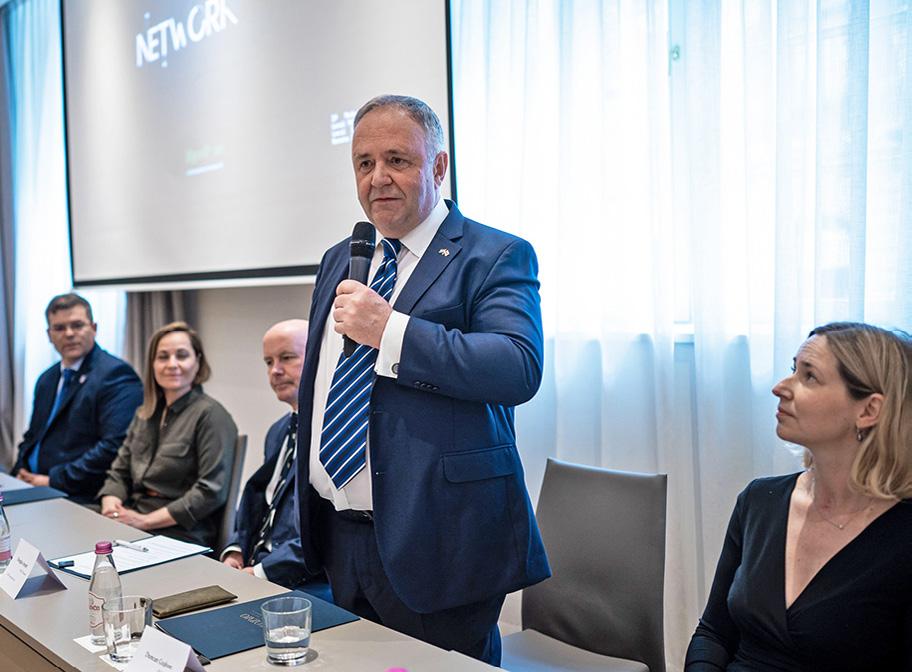
Across the five weeks, the masterclass was attended by more than 60 HR professionals and featured 12 experts, who shared their strategies and experiences related to building a people-first work culture.
At the first masterclass, participants could get a global view on the people-first approach and learn how it can contribute to a successful business strategy. The second event provided insights on how to ensure a positive employee journey, from recruitment till retirement or offboarding. Next came a session dedicated to the Hybrid Work Paradox and the question of how to effectively balance in-person collaboration and flexible remote work. The fourth week featured a highly informative discussion on compensation and retention. The closing session was dedicated to a workshop where participants were given the opportunity to apply the lessons covered at the previous four masterclasses in practice. They also learned how to design and manage cultural change based on behavioral science and apply it to a relevant situation in their team or organization.
This regular section of the Budapest Business Journal features news and events from various international business chambers. For further information and to register for specific events, visit the website of the organizing chamber. If you have information for inclusion on this page, send an email in English to Annamária Bálint at annamaria.balint@bbj.hu
Multi-chamber Event
The Netherlands-Hungarian Chamber of Commerce (Dutcham), the Swedish Chamber of Commerce in Hungary and Swisscham will hold a joint event called “How to Attract and Engage Different Generations.” What are the benefits of a mixed team? Listen to keynote presentations about various aspects of different generations’ expectations and behaviors from Erika Némethi, Randstad, and Ipsos. Learn from companies from various sectors like Electrolux and Ikea and participate in best practice discussions.
• When: June 15, 9-11 a.m. • Where: Electrolux Showroom, Váci út 80, Budapest 1133. • Cost: Members free; non-members HUF 9,000/person.
Swiss-Hungarian Chamber of Commerce (Swisscham)
An event called “Management Competence Development Using Business Self-Defense” is a special business training designed to discover the less conscious dimensions of communication, to develop adaptability, and to accept mistakes for the sake of development. The training method is based on actual experience, with easy-to-learn self-defense situations reworked into a business, metacommunication context. The trainer, Balázs Vaszkun, a Swisscham member, will call on his 15 years of competence development experience during the session.
• When: June 7, 2023, 9-11:30 a.m. • Where: La Place Stúdió, Szépvölgyi út 44, Budapest 1025. • Cost: Members free; non-members HUF 10,000/person (0% VAT).
French-Hungarian Chamber of Commerce and Industry (CCIFH)
The CCIFH HR Club will deal with a vital employment issue at a Hungarian language event which covers called “Inhumane Resource Management or When can an HR Employee Burn Out?”
Organizational psychologist, Júlia Füredi, the founder of sparQ tech will give the presentation.
• When: Tuesday, June 6, noon-2 p.m. • Where: Well Point event venue, Europa Design, Törökvész út 71-75, Budapest 1025. • Cost: Members: HUF 9,900 + VAT; non-members

HUF 14,900 + VAT.
The chamber will host its first corporate tennis tournament, a day-long event later this month. As well as the tennis competitors, family and friends are invited to attend and for them the founders of the Hungarian national amateur running club iRunMoreTeam will hold a skill-based, running-based sports session.
• When: Saturday, June 17, 9:30 a.m.-6 p.m. • Where: MLTC tenisz klub Mátyásföld Bökényföldi út 27, Budapest 1165.
• Cost: Members: competitors HUF 9,900 + VAT, companions HUF 5,500 + VAT; non-members: competitors HUF 13,000 + VAT,
companions HUF 7,500 + VAT. Includes unlimited water, juice and coffee, as well as a cold buffet lunch during the event.
The last remaining tickets are available for the CCIFH event celebrating the 150th anniversary of the unification of Budapest with large-scale garden party inspired by the last century.
• When: Friday, June 23 from 4-10 p.m. • Where: City Park Ice Rink and Boating Lake, Olof Palme Sétány 5, Budapest 1146. • Cost: Members HUF 32,000 + VAT; non-members HUF 45,000 + VAT.
4 Socialite | 31 www.bbj.hu Budapest Business Journal | June 2 – June 15, 2023

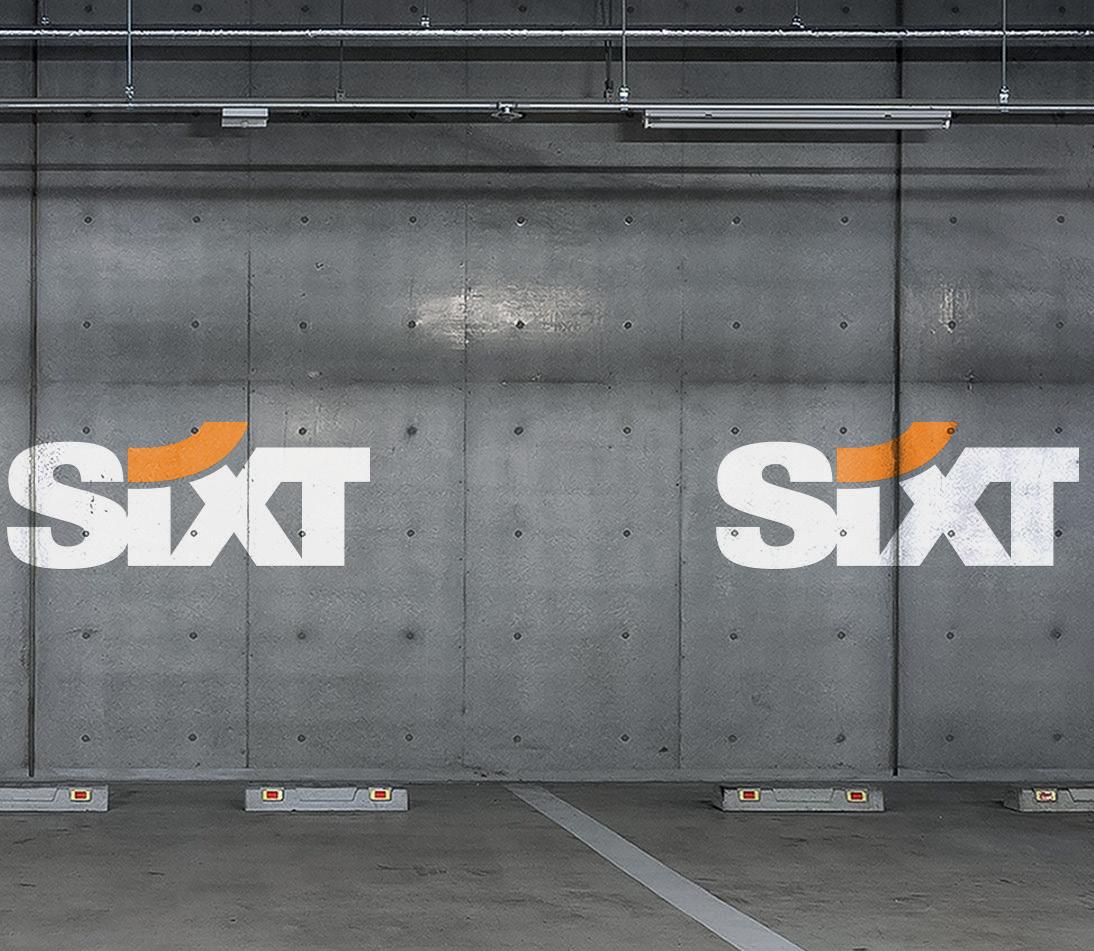

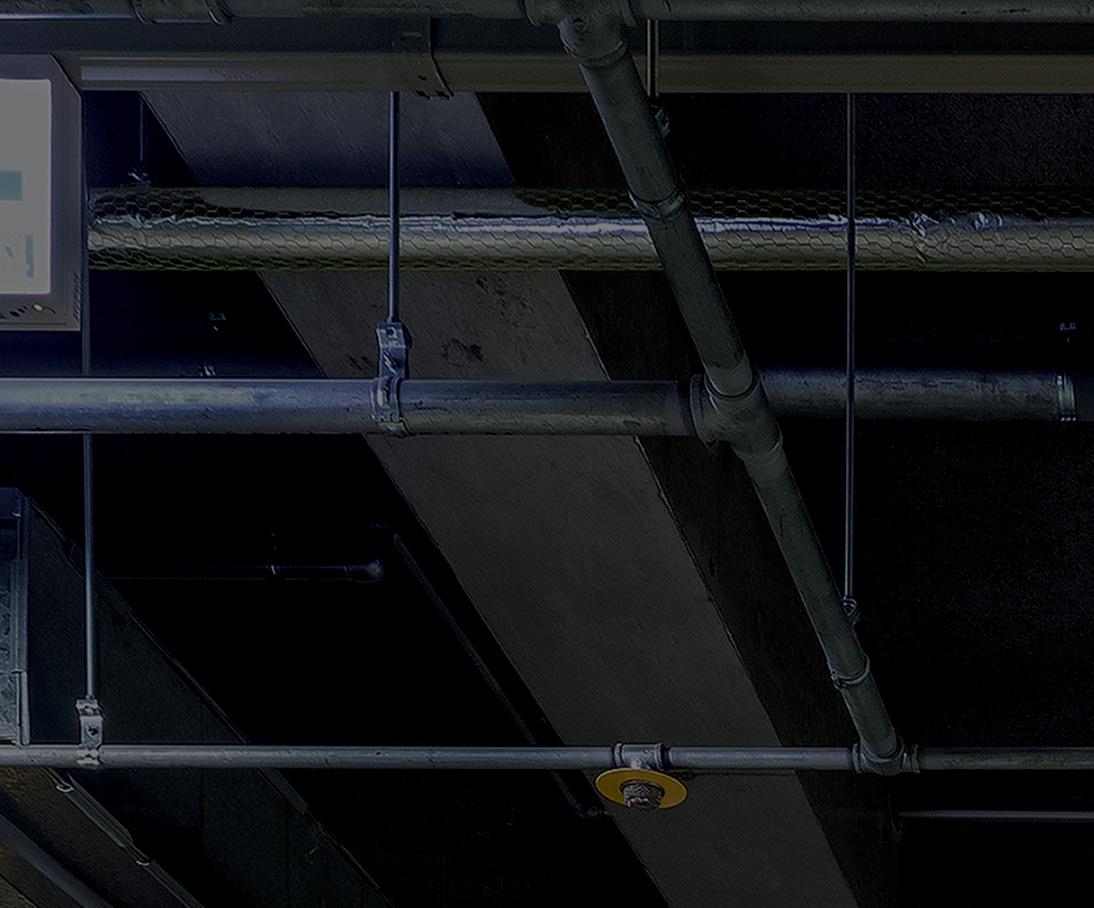
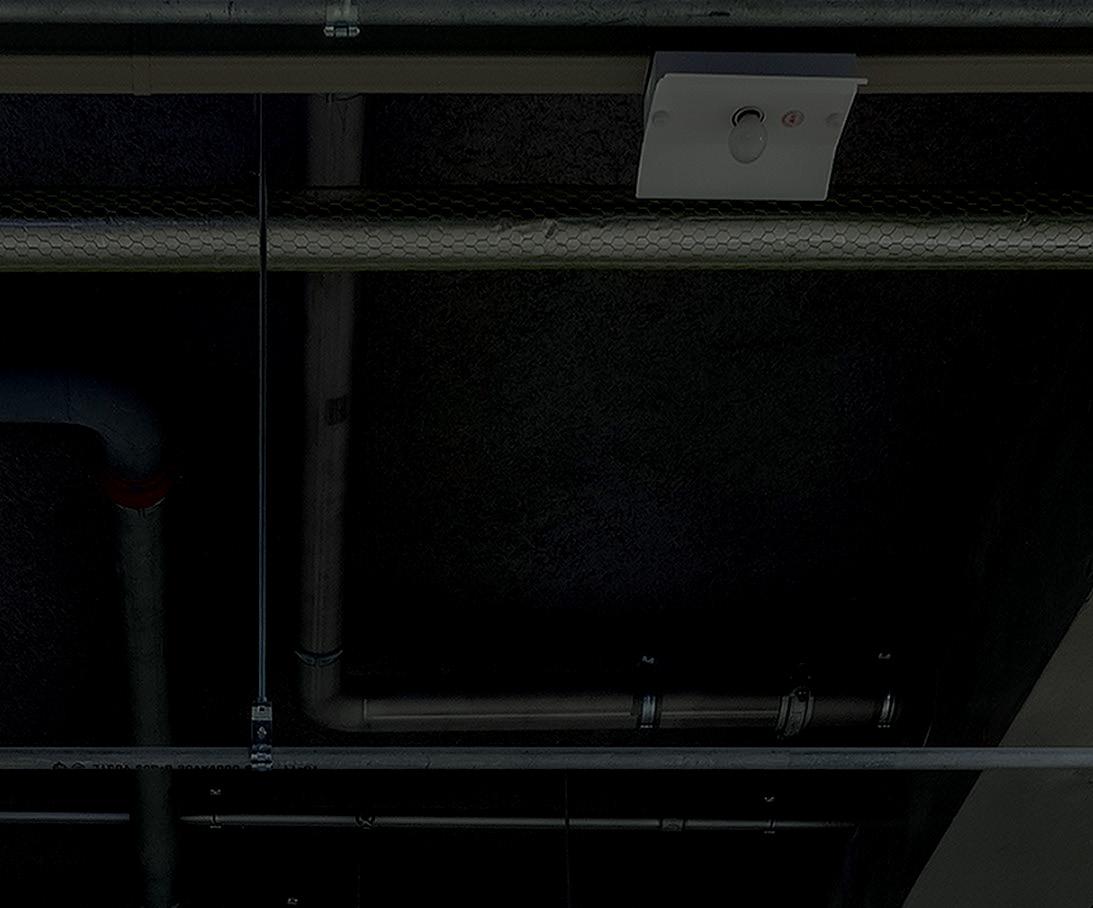






www.sixtbusiness.hu Choose your car NOW! Take it IMMEDIATELY! sixt.hu Leave parking! Business must drive on! Is there to much wait for your new company car? Let us show you the workaround: Sixt business company car offers 40 models in more than 30 categories, custom solutions, tailored for you.






















 Szecskay Attorneys at Law
Szecskay Attorneys at Law








 BSLAW BUDAPEST
BSLAW BUDAPEST















































